that he gave his one and only Son, that whoever believes in him shall not perish but have
For God so loved the world Eternal Life.

For the love of paul P16
april 2024 easter
Reflections P6
John 3:16


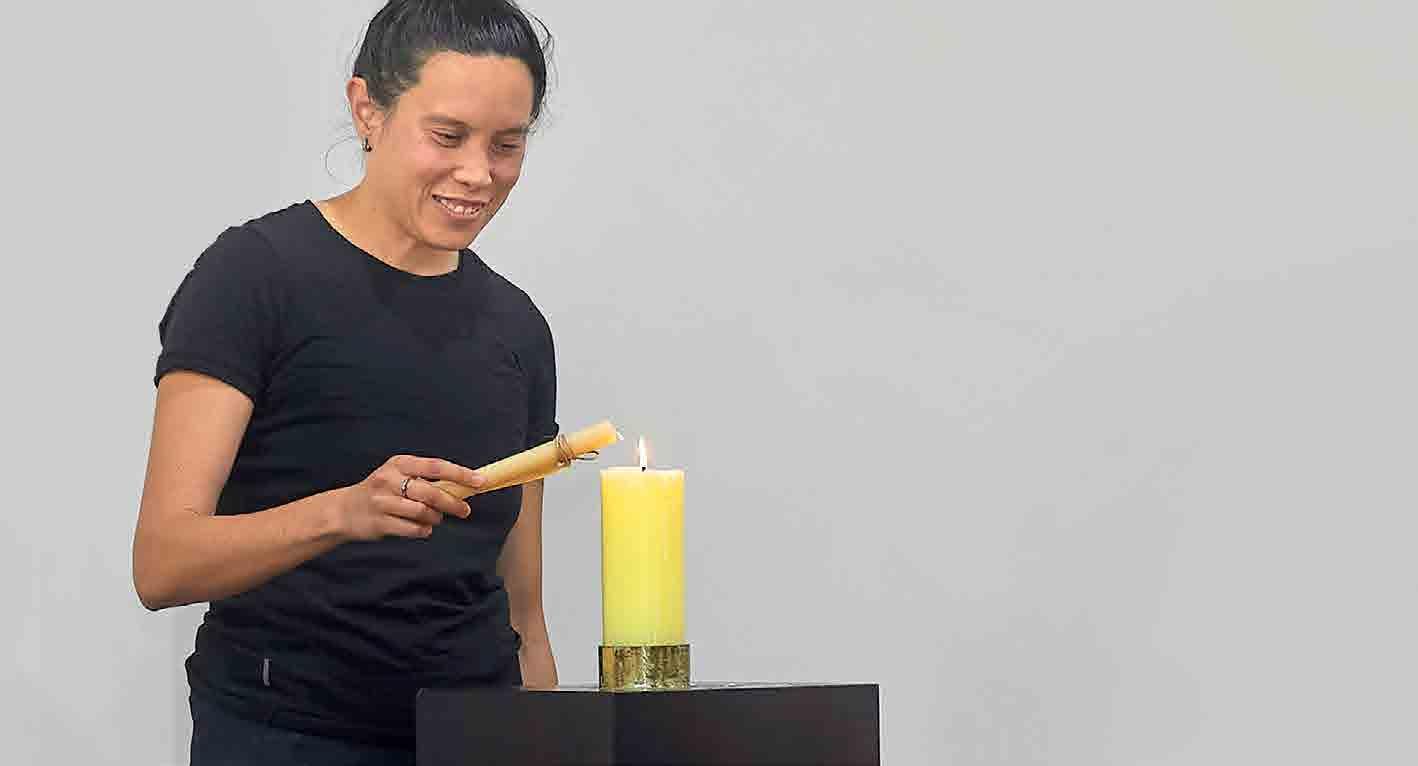
2 Leave a lasting legacy. Planning an estate is a personal process and a time to reflect on what matters most. If you are considering including Uniting in your Will, we would love to hear from you. Call us 03 9051 4743 Visit unitingvictas.org.au/gift-in-will Uniting is the community services organisation of the Uniting Church in Victoria and Tasmania. Pilgrim is the theological college of the Uniting Church in Victoria and Tasmania Pilgrim Theological College equips leaders for ministry in the Uniting Church and beyond. Learn about the practices, texts and traditions that shape and form the pilgrim people of the Uniting Church. More information study@pilgrim.edu.au 03 9340 8892 240219_Pilgrim
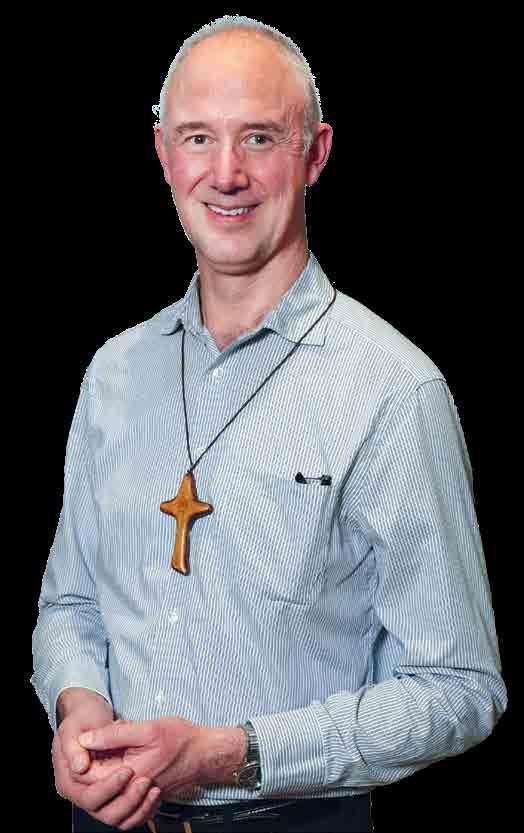

Vic Tas Synod
"The way of the cross is also the way of true life; may Christ give us grace to follow."
The Easter period, moving from Good Friday to Easter Sunday, takes us through the grand themes of death and resurrection, cross and hope.
Earlier in Lent when we heard the stories of Jesus telling his disciples that he was going to suffer, be rejected, killed, and after three days, rise again, we also heard Peter taking him aside and rebuking him (Mark 8:31-33).
Peter had only just declared that Jesus was the Messiah, and presumably could not make sense of the idea that the Messiah of God would suffer and be killed.
Later, confronted with the news of Jesus’ resurrection and the experience of his appearances, Jesus’ joy-filled disciples had to work out what to make of that.
The “good news” that Jesus had been proclaiming was not limited by his death.
Christian disciples ever since have been grappling with both of these key themes: death and resurrection, cross and hope. God meets us in both.
As I’m preparing this column for the Easter edition of Crosslight, I’m very conscious that many things could happen in the world between the time I write and the time that this is published.
Whatever the circumstances may be, though, the reality and significance of both cross and hope, death and resurrection will be important.
These elements speak to us personally and in community.
God shares in our death, even as God leads us into life.
In the passage in Mark 8 when Peter
struggled with Jesus’ talk of suffering, Jesus goes on to urge his listeners to stop clinging to life, and to follow him.
Across the Synod we have a Vision Statement which begins with ‘following’: ‘Following Christ, walking together as First and Second Peoples, seeking community, compassion and justice for all creation’.
Following Christ may include letting go of the ways that we might prefer to cling to life, to respond faithfully to where Christ leads.
I know that my own following of Christ is based in the love and grace of God that I see in Jesus, and in the way that his teaching leads to community, compassion and justice.
Through Christ I come to know God whose love is stronger than death.
In John’s gospel there’s a passage in which some people are turning away from following Jesus, and Jesus asks those who stay with him why they are doing so.
Peter’s response here is, “to whom can we go? You have the words of eternal life”. (John 6:68).
This rings true for me, and it is about life in abundance (John 10:10).
In all of our communities, as we celebrate Easter we encounter the God who shares in our death; we encounter the Christ for whom death is not the last word, and we encounter the Spirit who connects us to this death and resurrection story.
The way of the cross is also the way of true life; may Christ give us grace to follow.
3
Reverend
David Fotheringham Moderator
Faith in the public square
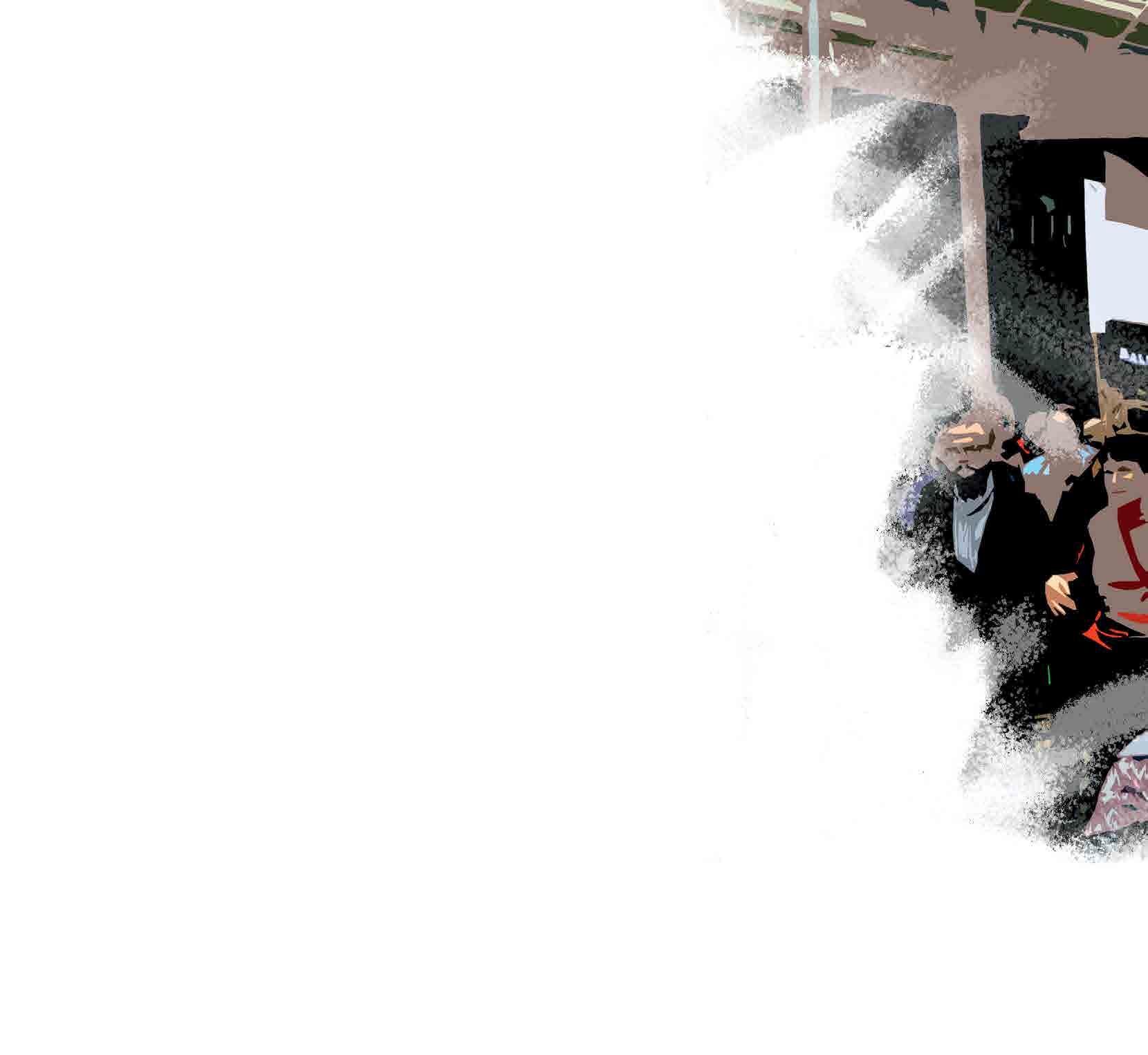
The Wesley Centre for Theology, Ethics, and Public Policy will be officially launched next month. Director Robyn Whitaker explains why it’s important to speak up about the big issues facing society.
This month, Christians around the world will celebrate Easter, a time of year when we reflect on what it means to find light, hope, and new life in an often dark, difficult, and unjust world.
Next month we launch the Wesley Centre for Theology, Ethics, and Public Policy.
It’s my hope that this new centre will find new ways to speak words of hope and life into the public conversation in Australia.
Since 2019 the Wesley Church in Melbourne, along with other UCA partners, has been thinking about what it might mean to bring a theologically informed, research-based Christian voice to the public square.
COVID-19 interrupted things for a time, but last year I was delighted to be appointed the inaugural Director of the Wesley Centre.
For me, it’s an opportunity to bring together my love of scholarly theology with my belief that Christians must engage with the big questions facing our society and that we have something to contribute to those questions as people of faith.
What is public theology?
If theology, in the broadest sense, is
reflecting on the God revealed in Jesus, then public theology is about asking what those reflections might have to say about the ethical, social, and political questions facing our world.
In their book, ‘For the Life of the World: Theology for a Flourishing World’, Miroslav Volf and Matthew Crossman write that “theology’s engagement needs to be both more theological and more transformative”.
Public theology is an attempt to speak out of our belief in the God who is love, into the world as we find it today - a world in which too many people are caught up in cycles of poverty and violence, in which many of us ignore or even despise those who are different to us, and in which our climate is changing in dangerous and damaging ways.
Public theology is not preaching, and it is not apologetics; but nor is it merely social commentary.
It involves looking hard, and lovingly, at the world, and trying to examine the problems and challenges we face through a distinctly theological lens.
It involves getting our hands dirty and grappling with current public policy debates, while at the same time interrogating the values that lie behind
those debates. The Wesley Centre for Theology, Ethics, and Public Policy will be an explicitly Christian voice in the public conversation.
When Christian voices appear in the media they often represent a very narrow range of Christian thought, sometimes reflecting an anxiety about change as the world moves further and further away from Christendom.
As fellow Christians we wish these voices well, but we think there is room for a greater diversity of perspectives.
After all, there is no single Christian view on many issues.
The Wesley Centre will speak out of the history and traditions of the Uniting Church, and draw from the great work done by arms and agencies such as Uniting VicTas, Uniting AgeWell, Pilgrim Theological College, the Synod’s justice cluster, and UEthical.
At the same time, we hope to create space for conversations with a vast diversity of partners, including those with very different views to our own.
How we conduct discussions will be just as important as what we discuss.
It has become a cliché to say that we live in a divided world, but it’s true.
People of faith live in bubbles no less
4

than anyone else, which is the opposite of what Jesus asks of his followers.
The Wesley Centre will bring people together in respectful and patient dialogue, exploring each other’s positions without rushing to judgment, respecting differences, and looking for common ground.
We will try to model the kind of dialogue a divided world needs.
What will we talk about? Anything that impacts the common good.
We will try to influence individuals within the church and without, as well as businesses, not-for-profit organisations, and governments.
Theology has something to say to every area of public policy, but a couple of examples spring to mind.
One is disability.
Australia is slowly coming to recognise the rights of people with disability, but there is a long way to go.
What does this question look like if we think of every person as held in the loving gaze of God?
How might theology have contributed to harmful attitudes towards people with disability, and how might this be corrected and healed?
How do people experience God in and
through their living with disability?
Another area of public policy which invites theological reflection is genderbased violence.
Theology, and particularly theology that focuses on gender roles and “purity”, has not always played a helpful role here.
Paul writes that in Christ “there is no male or female” (Gal 3:28), but the churches have been slow to learn this lesson.
When we ignore this radical equality, we risk contributing to the attitudes that lead to violence.
How might theology better speak to an Australia in which one in five women has experienced sexual violence?
The Uniting Church has a rich history of bringing the light of theological reflection to questions of public policy.
For our Church, ‘love your neighbour’ has always been about more than individual relationships.
The Wesley Centre for Theology, Ethics, and Public Policy is the next chapter in this already rich story.
As an ordained minister in the Uniting Church of Australia I have, in one sense, been doing public theology for many years.
It is what we do as clergy as soon as we step outside our church buildings and engage with communities beyond our walls.
As a school chaplain at MLC I realised I loved speaking beyond the traditional church and when on faculty at Union Seminary in New York, I witnessed the possibilities of public theology while watching colleagues like Cornel West, Serene Jones, and James Cone engage the public theologically.
On my return to Australia in 2016, I began writing articles to newspapers and appearing on television, radio, and podcasts in addition to my work as New Testament Coordinator at Pilgrim Theological College.
As Director of the Wesley Centre, I will now be in a dual role, with my time split between Pilgrim and the Wesley Centre.
Our website is now up and running.
Please check us out at www. thewesleycentre.org and look for details of our official launch event.
We’d love you to join us.
Rev Associate Professor Robyn Whitaker is the inaugural Director of The Wesley Centre for Theology, Ethics, and Public Policy.
5

Reflections on Easter
As we move towards Easter, five Uniting Church figures talk to Crosslight about what the death and resurrection of Jesus Christ represents to them.
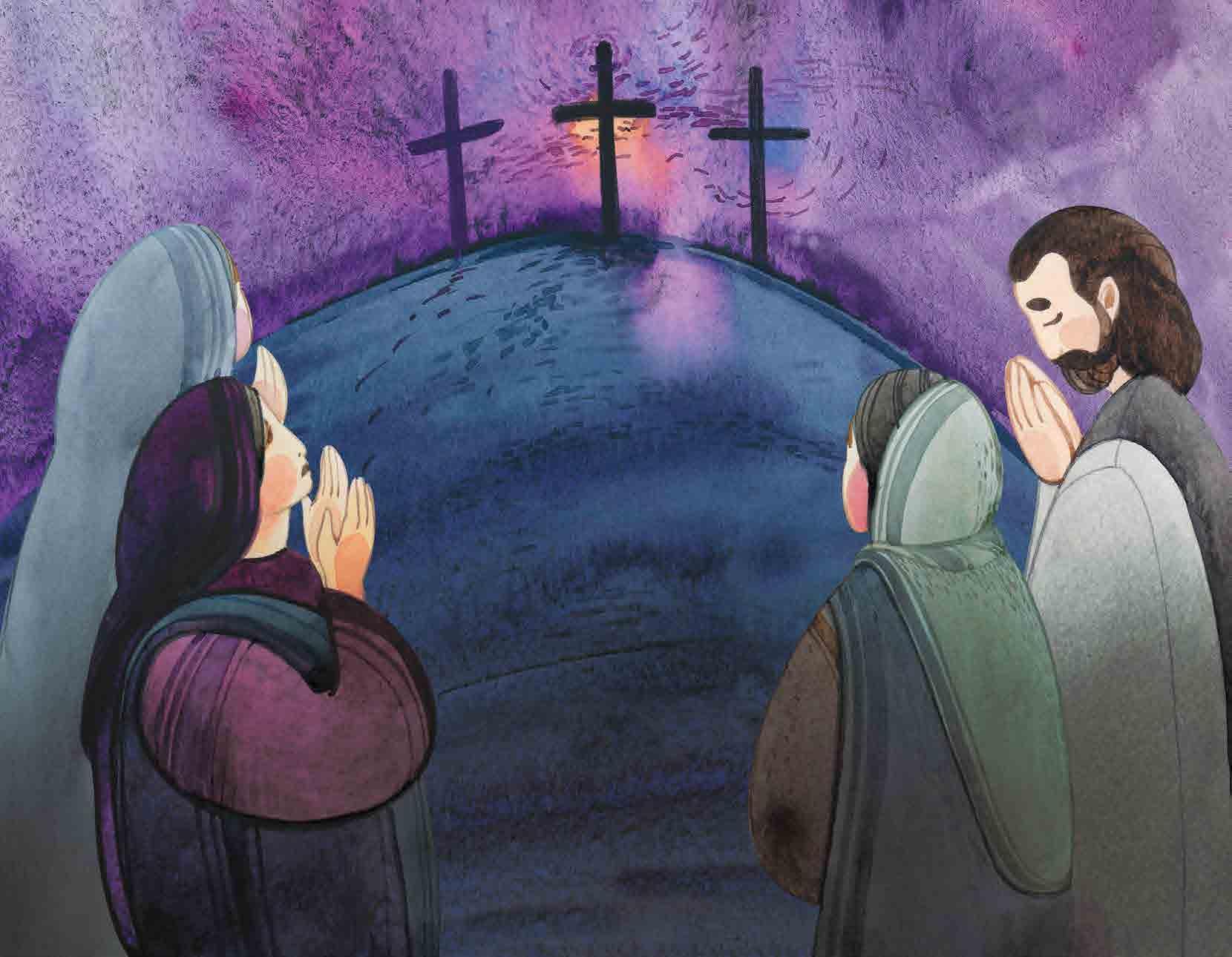 Rev Jay Robinson Minister and Chaplain
Rev Jay Robinson Minister and Chaplain
In the first year of my first placement, I was in conversation with a member of staff at Monash University where I was the chaplain.
We were talking about Easter and just what we were each doing at this time.
The university was closed over the Easter period, which was unusual as the university rarely closed and only on Australian-declared public holidays.
She was not someone who went to church and so was surprised when I told her of Holy Week’s services and events that were taking place leading up to Easter Sunday.
“I suppose this is your equivalent to Grand Final Week,” this avid football supporter said, and I replied “yes, it is”.
That description of the week leading up to Easter has stuck with me, and I always refer to my Grand Final Week.
The journey towards Easter Sunday is filled with remembrances, with stories, with shame at what people can do to others, as well as filled with wonder that
we have a God who loves us so much that Christ was sent to us. For me, the journey through that last week of Christ’s ministry before the resurrection is one of symbol and mystery.
As I have the privilege to take this journey with a congregation, I believe it is up to me to help them experience the journey as creatively and deeply as I can.
The use of images, sounds, reflections, actions and objects all help with trying to make that journey as meaningful and real as I can.
As I hear the responses from those around me about the importance of Easter to them, I learn more, reflect more and am challenged by the journey.
This is the coming of God’s son to be with us, to show us just what love really looks like.
This is what giving up your life for the sake of others looks like.
This is what forgiveness and grace looks like.
This is a life-changing event that
means things are no longer the same from here on in. I often wonder what it would have been like to be there at the time, to experience it as it happened, but I probably would have missed it or ran away to stay out of the emerging situations.
So, it is important for me to dive deeply into the events, be with the disciples, hear their fear and misunderstanding – it helps me as I speak with others who are exploring their faith and asking important questions. I also believe it is important to stop and sit in the darkness and silence of Easter Saturday.
We can move on too quickly from the horror of Good Friday to the celebration and miracles of Easter Sunday.
The Saturday allows space to reflect on what humankind can do to each other, the Saturday allows space for the hope and light to begin to seep in, the Saturday creates the expectation for all that Easter can mean.
6

Rev Ikani Vaitohi
Pilgrim Uniting Church
On Good Friday each year, members of Pilgrim Uniting Church in Yarraville walk the Stations of the Cross with friends from St Augustine’s Catholic Parish and Westgate Baptist Church.
As pilgrims, we walk from one church to the next, through the streets of Yarraville – a sprawling line of young and old, following a large wooden cross.
Last year, I joined this longstanding ecumenical walk for the first time. I found it to be a sombre and powerful reenactment of Jesus’ final journey to the cross. It was a profound reminder of why celebrating Easter continues to be the Church’s gift to herself and the world.
As our procession wove its way around the streets of Yarraville, I wondered: how do we go about making the cross this visible every day of the year, not just Good Friday?
How do we, as a local church community, make visible to our neighbours that the God of hope is already at work in their lives?
How do we communicate to others that the cross is at the core of our being, ingrained into our body?
That the cross is everything that we think and speak, that we hear and do –our collective call for action, grounded in a belief that love will always trump hatred, injustice and fear.
Easter is the lens through which we see through the cross to resurrection life.
Easter is the lens through which we see from doubt to faith and through fear to renewed hope, not just once, but again and again.
My hope is that our Yarraville community will not just see a wooden cross being carried down their local streets on Friday, March 29, give us a wave and then continue on, their lives unchanged. My hope is that they will discover the powerful reassurance of the cross for all of us caught up in the scary maze of modern life.
That they will come to know that through Christ’s resurrection, death did not succeed; death did not have the last say.
Rev Dr Ji Zhang
Port Philip East Presbytery
“On that day, the Messiah was nailed onto the Tree (of Life) for five periods of two hours. This was also the (Buddhist) Day of Sacrifice and Fasting. He was stranded on the Tree until the sunset. The heavens were darkened in four directions, and the earth was shaken. The mountain cracked. All the tombs in this world were opened; all the dead (the Prophets, the Saints, and the faithful in Christ) had been resurrected together with Him.”
This text belongs to the ancient scroll ‘Listen to the Messiah’. The 8th century scroll contains the first narrative of Jesus written in the Chinese language by a second-generation Syriac-speaking priest who lived in China. This passage has a remarkable assertion: the death of Jesus and the general resurrection of the faithful are not two events, rather they have happened together. Why?
To answer this question, I spent six months to translate and interpret the text. And I discovered the passage had a close association with the apocalyptic writing in Matthew 27: 51-53. But to understand the context, I reconstructed a trinitarian theology rooted in the Council of Nicaea (325) and recreated the dialogue between the Orthodox tradition and the Buddhism and Daoism in the Tang Dynasty. The study has become a mirror to my Protestant belief, and a window to see the significance of the mission to China by the Church of the East in 635.
For human beings, the deathresurrection of Christ and the general resurrection of the faithful are two ends of history; the former marks the beginning of Christianity, the latter unveils God’s final consummation of all things. For God, however, they are two phases of the same act. “God raised the Lord and will also raise us by his power”. (1 Cor 6:14)
The resurrection power derives from God’s creativity - the creation out of nothing. Here, history does not matter. Even the cross upon which Christ was crucified, and the Tree of Life stood in
the Book of Genesis, they communicated with each other through Paul’s insight of God’s salvation. “The first man, Adam, became a living being; the last Adam became a life-giving spirit”. (1 Cor 15: 45)
To further explain the significance in the cultural context, I revisited a trip that I did in 2014. I came to the Longmen Grottoes to see a new discovery of the Christian tombs. Over a period of 500 years, the whole mountain was the burial site of Buddhism until the rising of the Zen Sect which shifted the belief of salvation from the bodily reincarnation to the spiritual enlightenment. But at the back of the mountain, I discovered a group of tombs marked by a cross from the Church of the East. I measured all 15 tombs and discovered a commonality: small entrance and large chamber.
For Buddhism, burial is the reverse process of birth. Placing the body in the tomb goes through the narrow birth channel and returns to the womb of the earth. And then two doors will conceal the chamber – the body is in gestation again for the reincarnation.
I reimagined myself standing in front of the mountain, seeing the Buddhist tombs numbered in their thousands and I realised something. “All the Dead Have been Resurrected with Him”. This is a witness. No, there is no waiting for the dead to be awakened through the rebirth. In Christ, all the dead have already been resurrected with him.
Christianity is a tiny minority, just like me standing before the huge statues. However, in front of the overwhelming Buddhist culture, the Christians have witnessed the Good News. All of the dead are resurrected on the day of Christ’s death and born into eternal life together with him. This is the economy of God’s salvation.
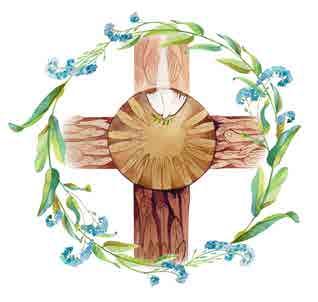
7
Continued
P8
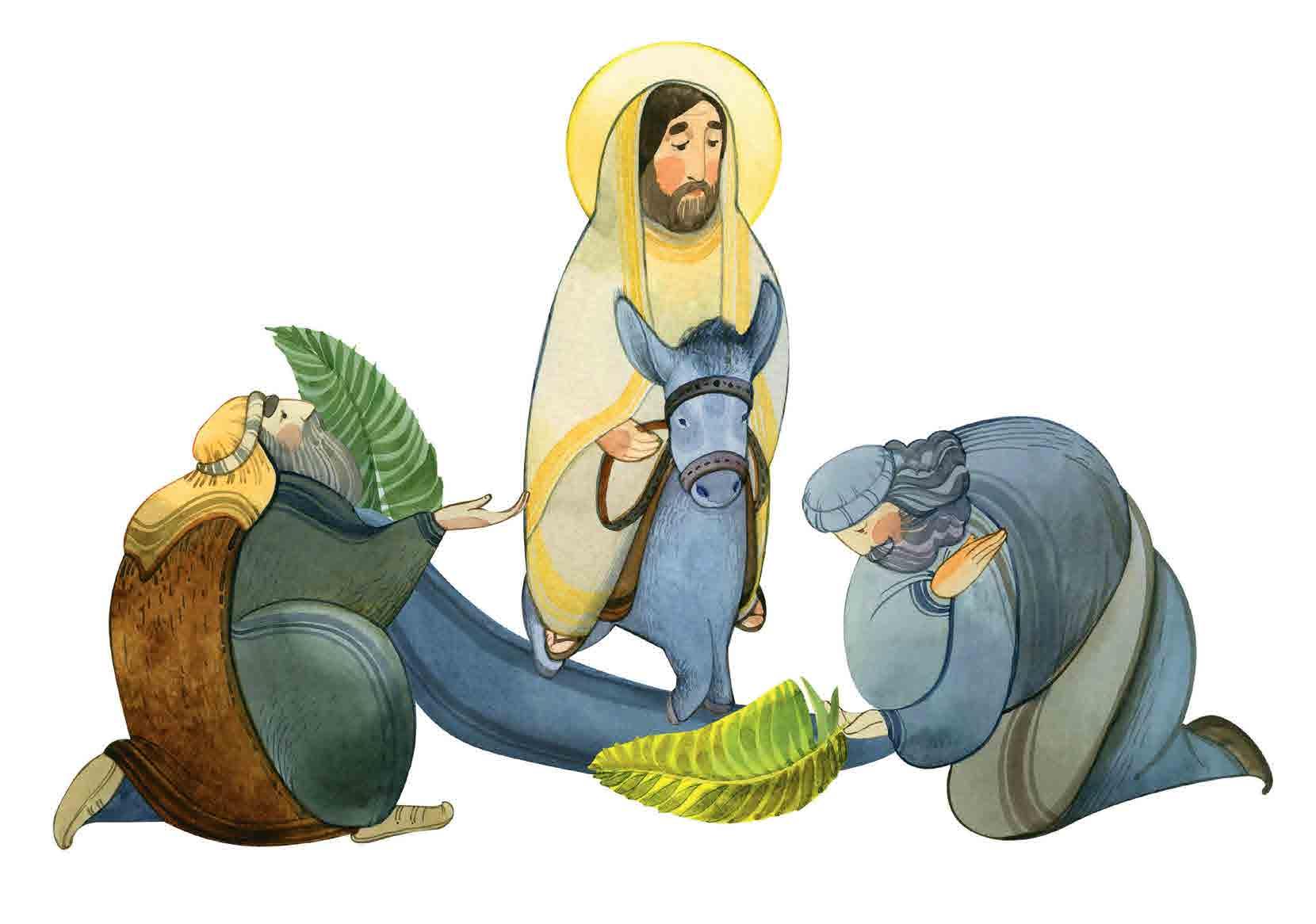
On a visit with my nieces and nephews I had the privilege of doing the bedtime story with them.
All four of them would pile onto one of the beds around me.
So I would read their favourite story and even when we got to the end, they would chime “again, again”.
As humans we are wired for story, and we all like to get pulled into a great story.
We tell stories all the time and hidden within the stories, like diamonds in the rough, are deep truths.
I heard a story about Joe, who in the week before Easter, was sitting beside his mother's bedside as she was dying.
She drew him close and with a raspy voice asked him to promise her something.
"Anything mum," he answers.
"I want you to go to church this Easter … will you do that for me?” his mum asks.
"Yes mum, I'll go to church this Easter," answered Joe.
Joe’s mother died just a few hours
later and, after her death, he kept his promise and went to church on Good Friday and Easter Sunday.
The next year when Easter came around Joe remembered his mum and his promise so he went to church again.
This continued for many years and every Easter he would turn up at the local church, sit through the service, shake the hand of the minister on the way out and leave.
Joe never went to church any other time of the year but when Easter came around, he would be there.
One year, as Joe was heading out the door and shaking hands with the Minister, he said, "I really enjoy coming to your Easter service each year, but I am wondering, do you think that next year you could tell a different story: every year I come it's that same one."
Each year, as the milestone dates and stories of our Christian year pass, we are challenged to engage with the story again and again.
To find the deep truths within them.
As a person of faith and a member of the people of God, at Easter I remember, reflect upon, celebrate, and retell the drama of the central story of my faith.
This story defines who I am as a Christian, it tells me about whom I follow and have committed my life to serve and why.
The Easter story, a story of life after death, a story where God’s love for the world conquers death, a story which invites us again and again, year after year, to consider the truth that there are dead places in our lives, and within our world, yet these places can be renewed to new life through God’s love.
Every Easter, Jesus is resurrected and once again we are asked to ponder what it means to be alive, to live in hope and faith, and to trust that God’s justice will indeed prevail.
There may not be another story that begs our telling over and over again more than the Easter story, for it is in this story where we find our hope, our joy, our peace, and the fullness of life.
 From P7
From P7

Rev Assoc Prof Kylie Crabbe
Uniting Church Minister and Associate Professor of Biblical and Early Christian Studies, Australian Catholic University
Not unsurprisingly, the Easter story takes up a sizeable chunk of each Gospel narrative. Indeed, Mark’s Gospel is often described (perhaps a bit melodramatically) as a passion narrative with an extended introduction.
That’s how central the story of Jesus’ betrayal, his unjust trial, death, and his empty tomb is for Mark’s story of “the good news of Jesus Christ”.
In Holy Week, we tell this story in stages. Palm Sunday is full of enthusiasm, but very much not the end of the story. From Holy Thursday to Easter Day we celebrate one long extended service. Over these great three days we get right into it: darkness on Thursday, as betrayal turns out all our candles. Death on Friday that goes to the very depths, like there’s no tomorrow, maybe. Perhaps a day on the apparent silence of Holy Saturday, before unalloyed joy on Easter Day.
We slow the story down so we can be attentive to each bit of it. But now we have a whole season of six more weeks holding it together. Because embracing only part of this story, any single part of it, is not big enough for real life. It’s all true at once.
I remember a conversation with a colleague working with people with serious mental illness. What do you say about Christian hope, she asked, to people for whom it will not “just get better”? Her answer was that you focus on the good news that the God of the cross is with us in it all. Radically.
This radical solidarity of the crucified God can plumb the depths with us. Perhaps it’s gotten you through your own dark night. It certainly has me. And it can help us to build communities of solidarity in the face of incredibly difficult things. It’s powerful. Like Dorothy Day giving a home to homeless people who showed up at her place after she published her ideas about Christian solidarity. She realised she would have to put these ideas into practice.

The claim that the God of the cross is with us is particularly powerful, though, because it is not simply solidarity in death, grief, and suffering. It is the presence of the Crucified and Risen One. We hold the whole of Easter together. The whole of Easter holds us together, even (or especially) when it feels like we might fall apart.
This is also a reason to be careful about rushing too quickly into blithe claims about resurrection. When my husband died in a car accident, I couldn’t bear to sing “death has lost its sting”. “Truly?” I railed against Thine Be the Glory’s lyrics. In so many ways, in so many situations, I felt death was still very much full of sting. We see it in death in Gaza, Israel, Ukraine, Somalia, and North Korea. Death in our over 30-year failure to implement recommendations of the Royal Commission into Aboriginal Deaths in Custody. In losing ground on most of the Closing the Gap measures.
And in the tears in the eyes of so many of us, like me, struggling to sing triumphant hymn words, over deaths very close to home.
Easter isn’t a way of sentimentalising very present realities. It isn’t that small. It is looking very directly into the absolute heartache of all that is not yet right in our world. And it is being startled by the promise that risen life will come into the most heartbreaking places and transform the world. There will be a day with no more tears.
And while we nurture that hope, leaning into it with our action, seeking the Spirit’s guidance and company as we likewise work for change, we nurture also this confidence.
That there is nowhere too broken, too betrayed, too full of regrets at our own bad behaviour, and nowhere so infused with the stench of death, that God in Christ has not been there and will not meet us even now.
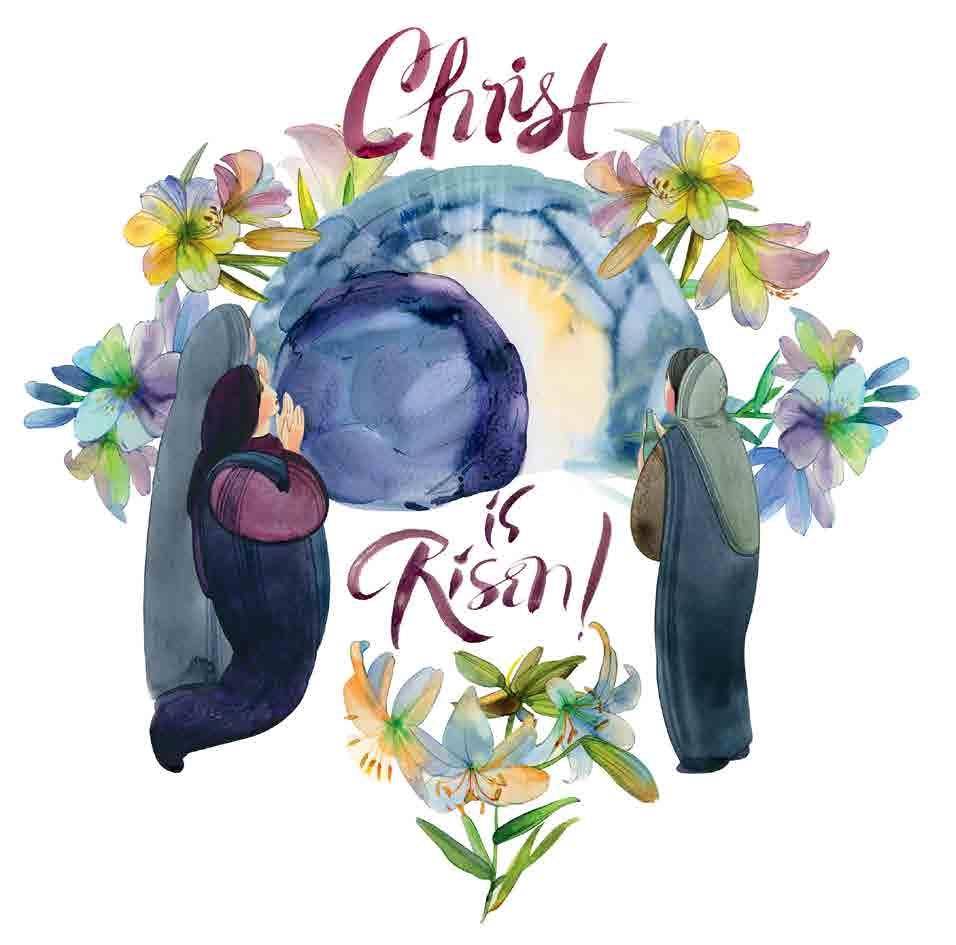
9
HOPE AND the hub

Uniting Church Ministers Alex Sangster and John Tansey, with a group of willing volunteers, are doing wonderful work helping some of St Kilda’s most vulnerable residents.
By Andrew Humphries
On the streets of St Kilda, Uniting Church Minister Rev Alex Sangster gets a daily glimpse of why missional work is so important in the lives of so many people.
At the 101 Engagement Hub on the corner of Carlisle and Chapel streets, Alex, her fellow St Kilda South Port Uniting Church Minister Rev Deacon John Tansey and a committed group of volunteers are doing what they can to make each day a little bit easier for some of the city’s most vulnerable people.
The engagement hub is the most visible example of outreach, providing programs, support, breakfast and lunch to up to 80 people each week day.
“The call for me to join the community at St Kilda was around the work that they’ve been doing for 40 years at the engagement hub, with some of our most vulnerable people,” Alex says.
“That was work I had always wanted to do and had sought out in whichever ministry placement I was in, and this was a placement that allowed me to do it in a more grounded, gritty and day-to-day way.
“The people that come to the engagement hub are so vulnerable and so filled with trauma, and often so broken by the world, but they need somewhere to go that feels like home.
“And the truth is that the engagement
hub is hilarious, and holy and humble, and I feel very privileged and lucky to be a part of it.
“There is nowhere else I would rather be.”
It’s a sentiment shared by John, who has returned to St Kilda, a placement he first held for 15 years from 2001.
Like Alex, it’s the work that John can do in the missional space that is so important to him.
In fact, it’s the very reason he jumped at the opportunity to become part of the new congregation.
“Even when I was first there, the mission part of the role through the engagement hub really fitted in with what I’m about,” John says.
“That was a big part of why I went to St Kilda and, at that time, I doubt I would have gone into a congregation that didn’t have that strong sense of mission.
“With St Kilda there was a good balance of worship and mission.”
Twenty-three years later, John is still as passionate about the missional side of his work as ever.
“I think it’s the fact that there are so many things happening around that space,” he says.
“It creates a sense of community for people who are so often isolated, and a space for people who are dealing with
that loneliness and isolation.
“A space that is free to access and where people can get support and a feed and some sense of community is vitally important.
“We’re creating a community where people are welcome and it doesn’t matter if they’re unwell, or what they look like or what they’re wearing, they are welcome and included.”
The great work at the engagement hub doesn’t happen, though, without wonderful volunteers.
“There are amazing volunteers like Tito, who is 90,” Alex says.
“He has been running methadone programs in St Kilda for 40 years and also works at an Aboriginal women’s refuge two days a week helping women withdraw from heroin, and then he comes and washes dishes at the engagement hub.
“We have a core team of workers who've been here for a really long time and have been through changes, and they’re an astonishing little community of human beings who are so loved by the participants.”
For Alex and John, their work with some of Melbourne’s most marginalised people goes to the heart of what being a minister is all about.
After all, as Jesus says, “it is more
10 Continued P12
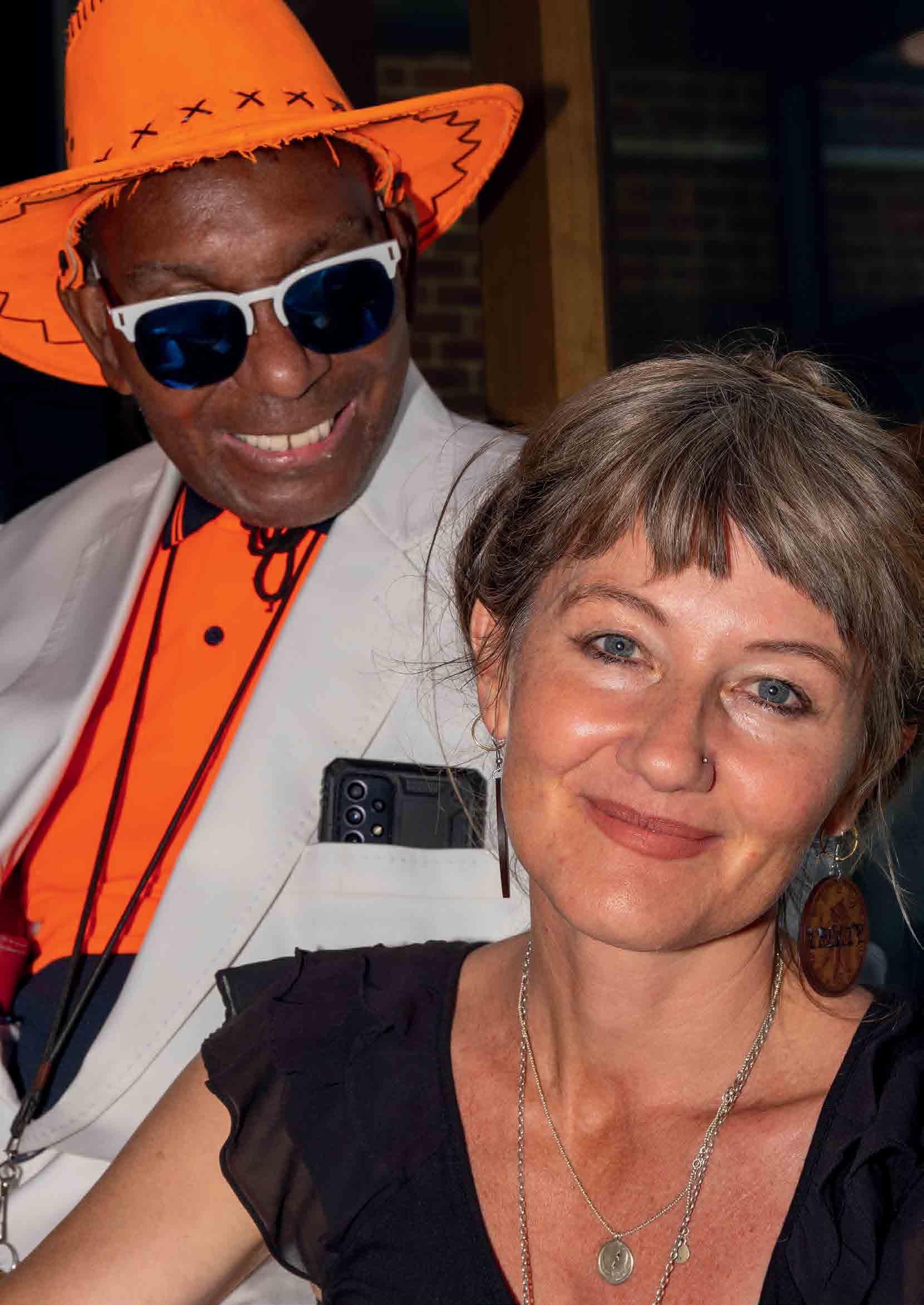 Rev Alex Sangster with Peter, one of the engagement hub’s long-time participants.
Image: Carl Rainer
Rev Alex Sangster with Peter, one of the engagement hub’s long-time participants.
Image: Carl Rainer
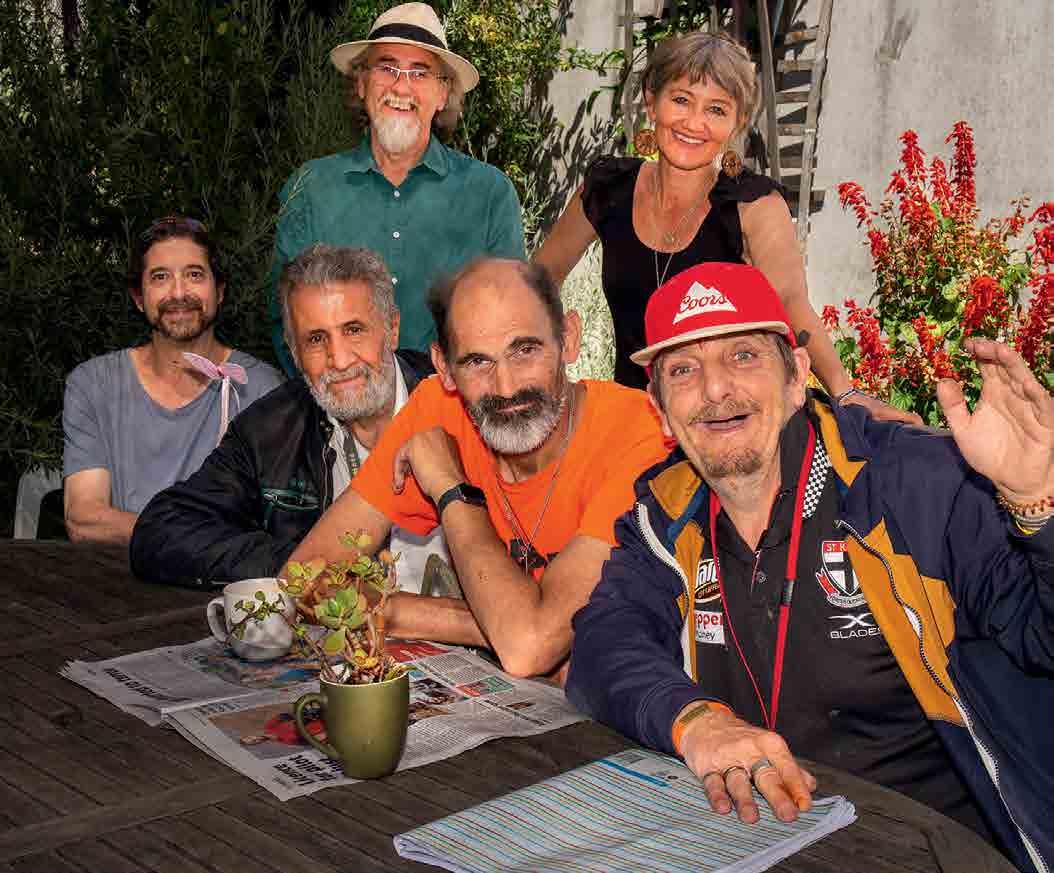
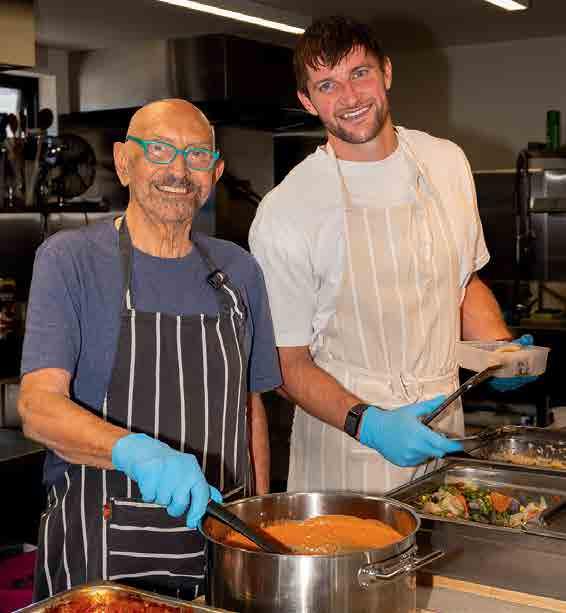
blessed to give than to receive”. It’s an edict that has seen Alex literally climb fences to connect with those in need.
“One of the first things we discovered at South Melbourne, where there is a very beautiful old building with social housing behind it and a huge housing commission tower, is that historically there's basically been no connection between the social housing, housing commission tower and the church,” Alex says.
“The social housing units are set up for older people who have nowhere else to go, and so I really wanted to connect with them.
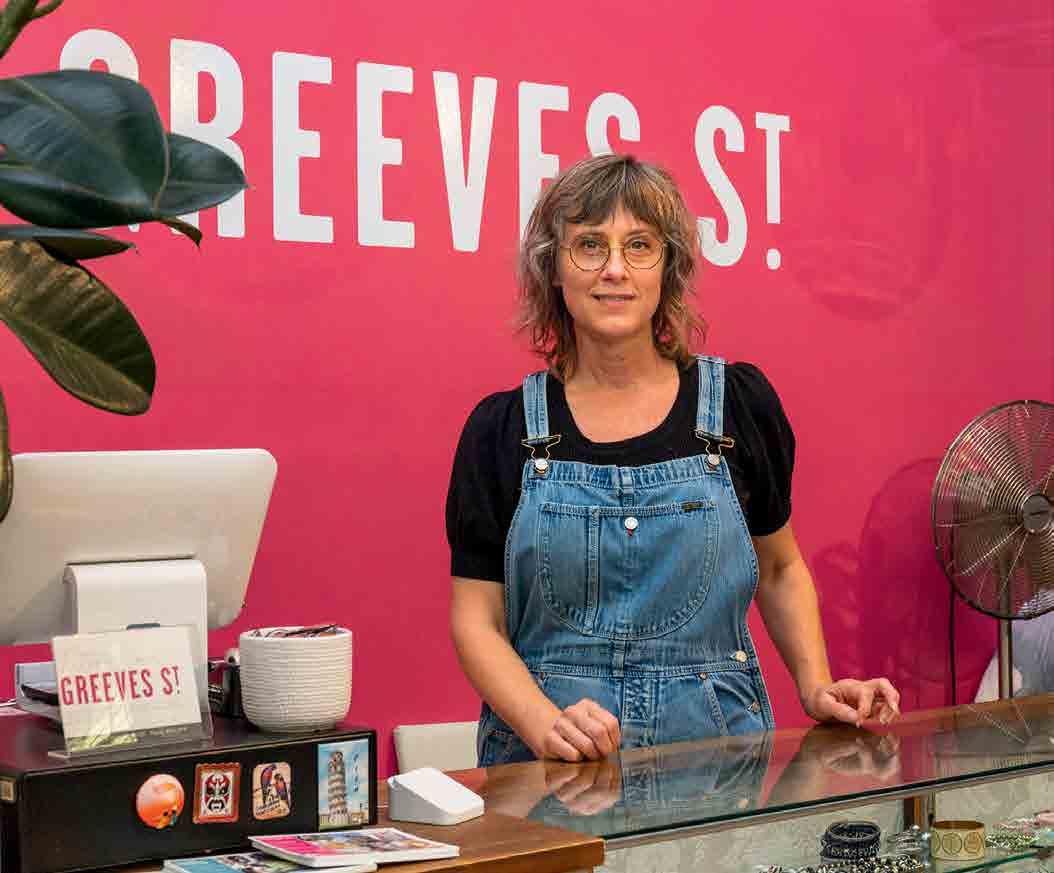
“However I couldn’t work out how to see them because it’s all closed up and you need a swipe card to get in, so in the end I jumped the back fence that we share with them and started knocking on doors.
“Because of that we began to meet our neighbours and now a whole lot of them attend church.
“We also run a mission meals project on a Thursday night, which started with just three people, and now we're up to a regular attendance of about 50 people, and wonderful things are happening as part of it.
“There were a few weeks where different men were turning up at different times and then they all realised that they all lived in the same housing estate, and now they all come to the dinner together and they walk home together.
“One of the guys that has started coming, and also occasionally comes to church, is Jewish and then another guy who comes quite regularly is Muslim, and so they have formed this incredible relationship and they come to church together.
“So there's been lots of spirit moments that came about just by opening up the doors, jumping a fence or two and seeking out our neighbours.”
John says the engagement hub goes to the essence of what ministering is about.
“For me, it’s about looking outside the congregational aspect into the community, but it doesn’t have to be one or the other,” he says.
“One of the motivating things for me in the sense of a calling was to do this type of missional work outside the church assisting those who are struggling and aren’t being cared for.
“It’s helping people who are isolated, lonely and are unwell for various reasons.
“To share this work with Alex, who also has a strong sense of social justice, is really important.
“I think we’re both on the same page in that sense, and it’s important that as a team we can work together.”
Images: Carl Rainer
12
From P10
Missional work is at the heart of what Ministers, Rev Deacon John Tansey and Rev Alex Sangster, love about their roles.
Image: Carl Rainer
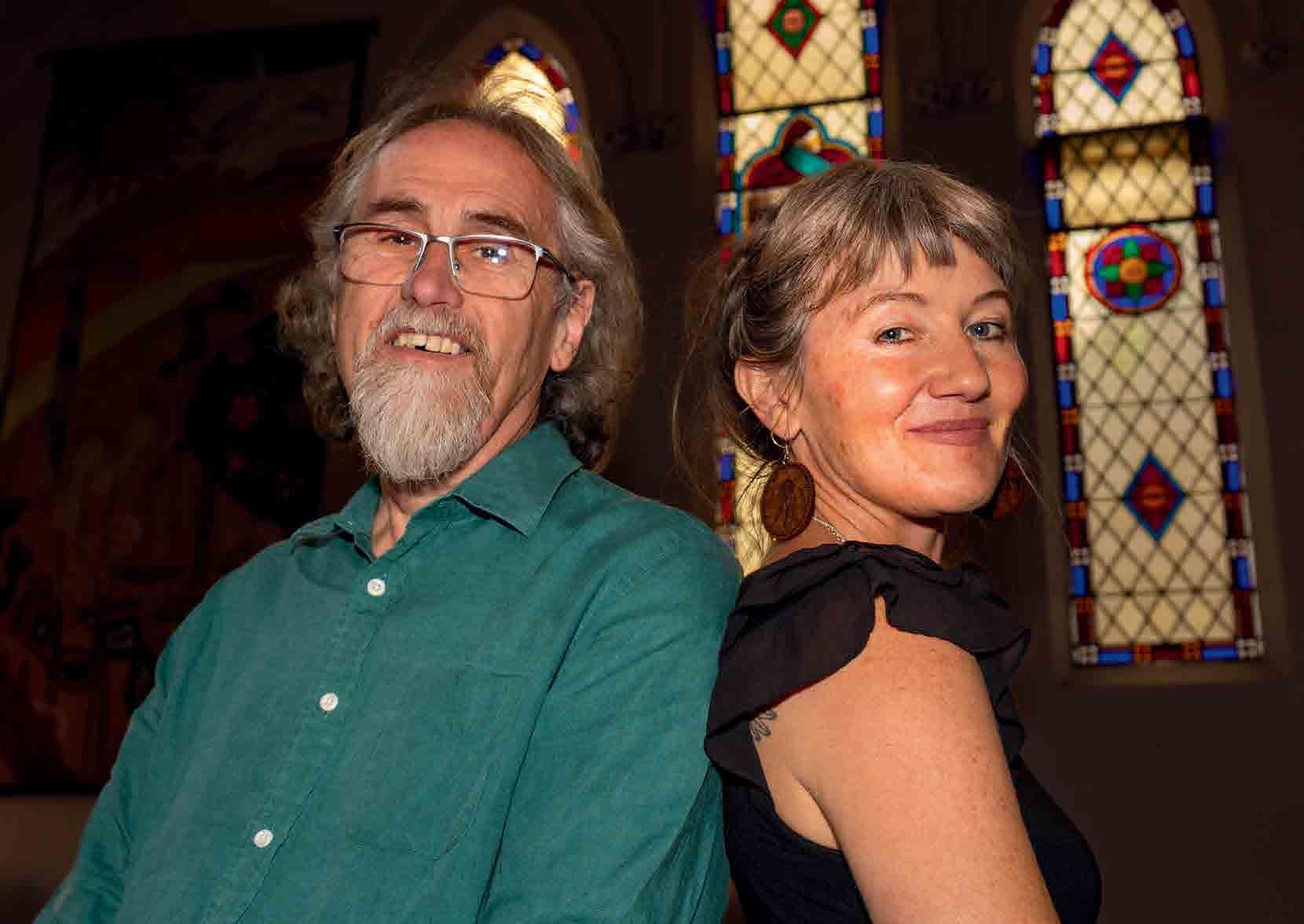
Three into one adds up
When the idea of an amalgamation between the congregations of St Kilda, Port Melbourne and South Melbourne was first raised, a fundamental question occurred to Rev Alex Sangster.
What would happen if the Port Phillip area no longer had a Uniting Church?
“The first question to consider among all of the amalgamation talk was would it matter if we weren’t here, if the Uniting Church shut down in Port Phillip?” Alex says.
“And then I looked around and thought to myself, ‘yes, it would matter a great deal’.”
It matters, says Alex, because for many people the Uniting Church and its progressive values represent a beacon of real hope in the Port Phillip area.
“Port Phillip has the highest number of LGBTQI+ people, as an area, in the whole of Australia, yet we're the only church that has the rainbow flag hanging on the outside,” she says.
“It’s important that we’re here and that there's a progressive theology which is not just spoken about, but is actually embodied and lived out in the DNA of the community.
“We're the only church that will baptise you, marry you and bury you if you are a trans person so, yeah, we need to be here.”
As the congregation last month marked the first anniversary of the formal recognition of amalgamation, it gave Alex the perfect opportunity to reflect on what was achieved in only nine months.
Before amalgamation, St Kilda had about 15 members, South Melbourne seven, and Port Melbourne had eight.
“It was a nine-month journey involving a generous and really prophetic group of people who said to themselves, ‘let’s get this done and not waste any more time’,” Alex says.
“Port Melbourne and South Melbourne had been a sort of semi-partnership for 30 years and, so as Minister at St Kilda, my first question was ‘who are my neighbours?’
“I’ve always been a passionate believer in congregations coming together, not just for the practical reasons, but also for
theological and spiritual reasons.
“Amalgamation worked because the members from all three congregations were courageous and generous and approached the task with a steely-eyed grit.”
The St Kilda, South Melbourne and Port Melbourne experience has taught Alex that amalgamation can bring a world of joy to congregation members.
“What I would say to church communities and congregations is there's nothing to be afraid of about welcoming a stranger to your table, and that stranger might be the congregation down the road,” she says.
“When we were going through amalgamation I said to everyone, ‘we are just going to have to be a bit like John the Baptist about this: we're not going to be Jesus in the gospel of Luke, we will be Jesus in the gospel of Mark, and we're just going to get stuff done.
“Amalgamation can be a difficult conversation for some congregations and I think we need to radically look at our theology as to why that is.
“If you’ve been listening to the gospel for 80 years and you still don’t want to share, something has been going wrong with our preaching.”
13
statement
Whether it’s assisting congregations in how best to cope with natural disaster, or guiding people along the path to lay leadership, Mel Perkins is doing important work in her role within the equipping Leadership for Mission unit.
By Andrew Humphries

In the summer of 2019-20, Australians watched on in horror as large parts of the country were destroyed by fire.
Images which showed people trapped on the beach at Mallacoota with nowhere to go made their way around the world.
Four years later, some sense of normality might have returned to Mallacoota but, like so many other towns impacted by bushfire, or any other natural disaster, the scars still run deep.
We often get very little warning of a natural weather event, but that doesn’t mean we can’t be as fully prepared as possible for what lies ahead when one eventuates.
preparation training and, alongside National Disaster Recovery Officer, Rev Dr Stephen Robinson, she is giving them the tools to make the task of dealing with a serious weather event a little bit easier.
The work being done by Mel and Stephen is also crucial in showing congregations how to navigate the long and slow road to recovery after a natural disaster.
and congregations, to help them be prepared for disasters.
“It takes congregations through a basic understanding that we are always in a disaster cycle, and how important it is that when a disaster strikes we don’t get in the way of those people who have an immediate job to do.
" We talk about … the road to recovery that awaits people after a disaster."
Mel Perkins
In her role as Lay Leadership Co-ordinator within the equipping Leadership for Mission unit, Mel Perkins believes helping congregations, and communities, prepare for and deal with the aftermath of disaster is some of the most important work she does.
It’s vitally important, says Mel, that Uniting Church congregations everywhere undertake disaster
The two-part training course taught by Stephen offers practical and achievable ideas for before, during and after disasters, and can be conducted online or in person, according to a congregation’s needs.
“Stephen did his PhD on disasters and has done further study in this area, and heads up the disaster management team within the NSW-ACT Synod,” Mel says.
“The training he has developed can be utilised as workshops, for individuals
“When a disaster happens there are things that need to happen around governance, and emergency services and chaplains need to come in, but it’s important we don’t get in the way and try and set up our church as some form of competition in all of this.
“During the training workshops we talk to people about how important it is to prepare your congregation ahead of a natural disaster, and what that means, and how to be a help, not a hindrance in your community after a disaster has occurred.
“We then talk about what happens when everyone has left, and how to tackle the road to recovery that awaits people after a disaster.”
Leading disaster preparation training is just one of the many hats Mel wears
14

as Lay Leadership Development Coordinator, a role she describes as truly multi-dimensional.
“It’s such a big area and so much links to something else, but basically anyone in a position of lay leadership within the Uniting Church falls in my basket,” she says.
“That can be anyone from Ministry of Pastor to Ministry of Lay Preacher, the two specified ministries in lay leadership, through to the person working in the church office, or church councillors and elders.
“It also involves faith development and teaching around governance, but really it’s anything that falls within the scope of lay leadership, and helps an individual to grow in their congregation or faith community.”
Lay preacher candidates can undertake biblical and theological study either through training approved by the Uniting Church Assembly, or through Pilgrim Theological College.
People considering a Ministry of Pastor role are expected to display the core competencies of working within the doctrine, ethos and polity of the Uniting Church, understanding
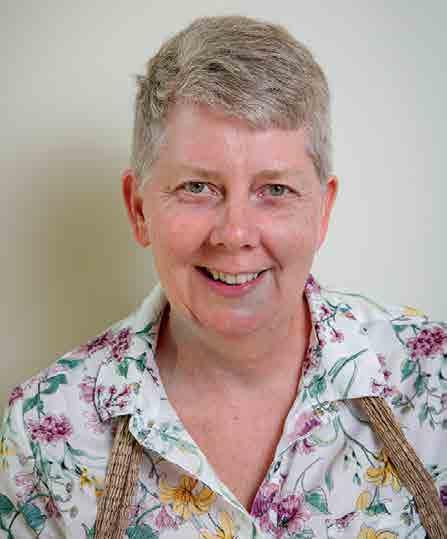
the Code of Ethics for Ministers, and displaying general competencies around community development, education, evangelism, leadership, pastoral care, organisation and administration, and worship and preaching.
For those considering ministry, perhaps the most important time spent will be during the period of discernment each candidate is encouraged to undertake. During this period, candidates are given the full resources
of the Uniting Church as they discern whether ministry is, in fact, the path they wish to travel.
“It’s usually a minimum of a year in which the person discerns what God’s call is for them in their life,” Mel says.
“It’s an opportunity to take some time out with a mentor who is provided by the Church, with a real degree of flexibility.”
Mel stresses that no one should go into discernment with preconceived ideas around what the end result might be.
“It might mean ordained ministry, or lay ministry, but it also might mean the person goes off and becomes a nurse, a doctor or a teacher,” she says.
“And that's the very nature of discernment, that at the end of it hopefully the person has discerned where their future lies.”
Whatever their decision, Mel and the full support of the Uniting Church will be with them every step of the way.
Mel can be contacted on 03 9340 8843 or by email at mel.perkins@victas.uca. org.au
A wealth of material on faith development, governance, and pastoral care is also available at https://www. ctmresourcing.org.au
15
Sunshine and shadows
In 2016 Paul Townsend died of a drug overdose after battling schizophrenia for nearly 20 years. His mother Mardie has written a book detailing a life of promise cut short by mental illness.
By Andrew Humphries
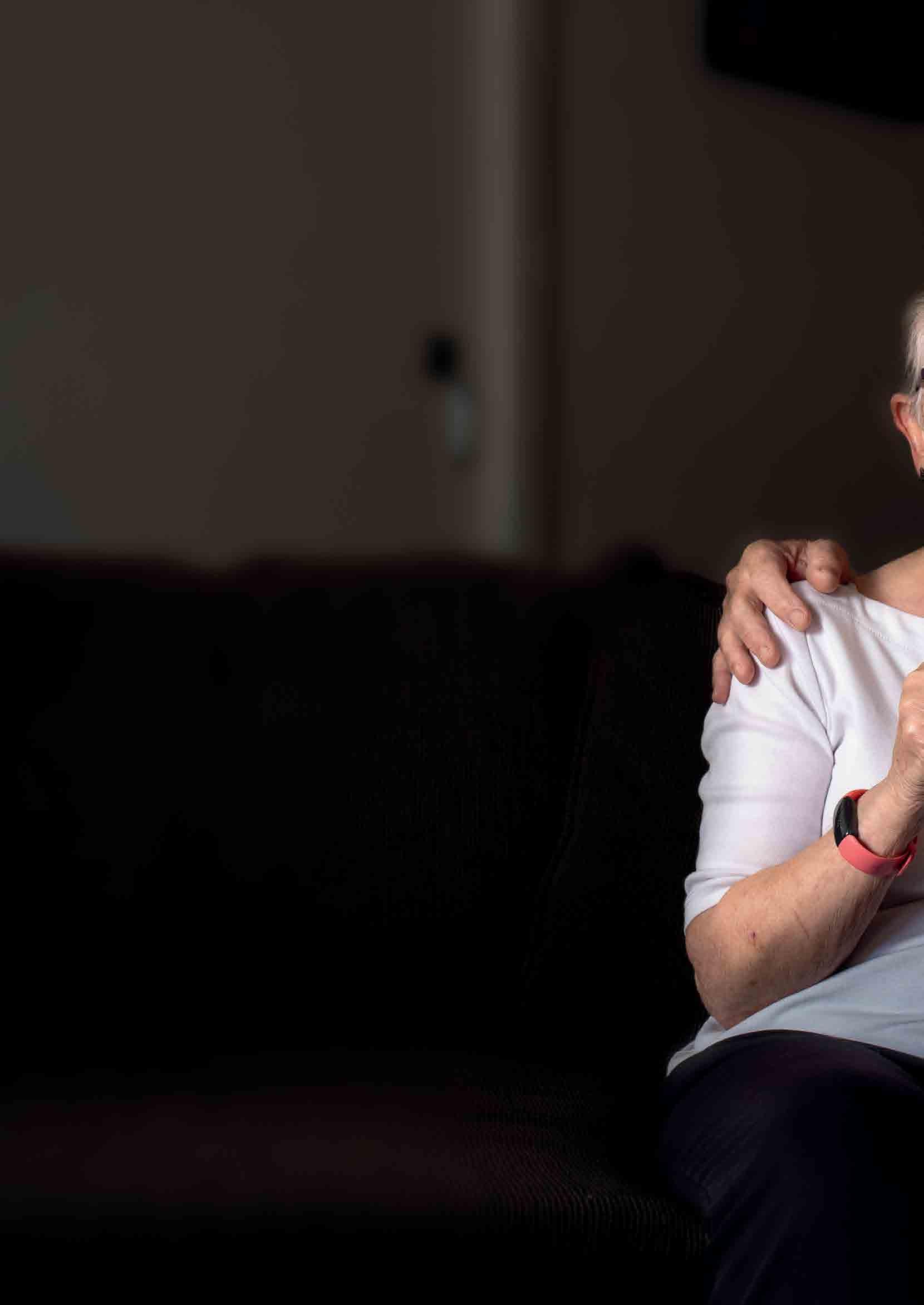
Mardie Townsend often talks to her son Paul.
And that’s when the tears come.
After all, a parent should never have to bury their child.
“When we are at Bonnie Doon, I often go for a walk and when I walk past Paul’s cairn I say (in my head), ‘hi Paul’, and he replies (in my head) ‘hi Mum’, his voice, his inflection and intonation all as clear as a bell,” Mardie says.
“That’s when my eyes fill with tears.”
Paul died on July 1, 2016, his death from a drug overdose ending a life of rich potential blighted by the shadow of schizophrenia.
When Ormond Uniting Church congregation members Mardie and her husband Ron talk about Paul, they tell a story of love and hope, of sadness and despair, and a level of anger that, right at the end, Paul was let down in his
hour of need. With brutal honesty they also talk of a sense of relief when Paul died, bringing to an end nearly 20 years of unimaginable stress dealing with an adult whose actions, at times, pushed them to the absolute limit.
“We always imagine our children will carry on after us, and to have to bury your child is so confronting,” Mardie says.
“Paul’s death was a shock and we
Continued P18 16
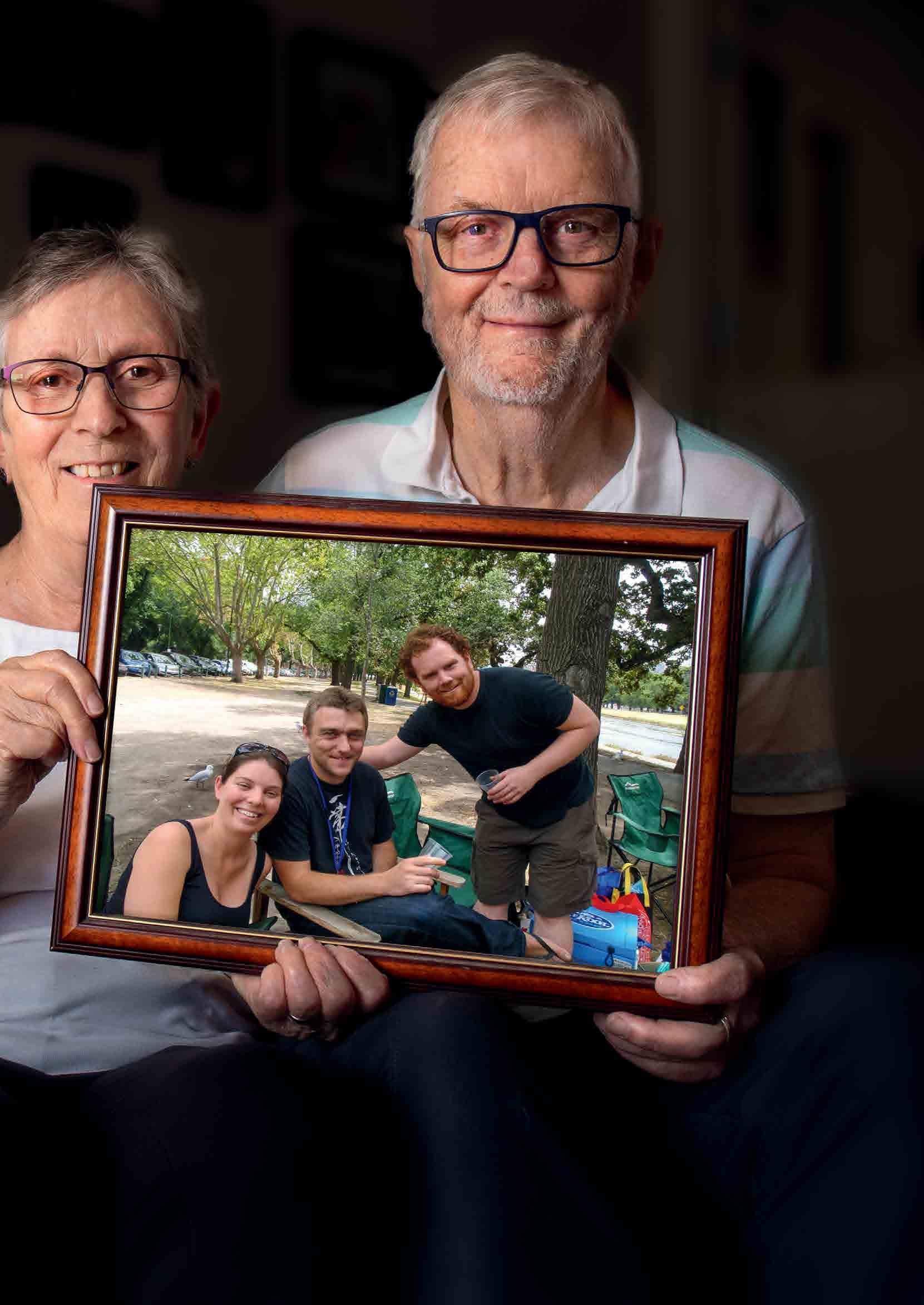 Ron and Mardie Townsend hold a photo of Paul (middle), Ruth and Joel at Paul’s 30th birthday picnic.
Image: Carl Rainer
Ron and Mardie Townsend hold a photo of Paul (middle), Ruth and Joel at Paul’s 30th birthday picnic.
Image: Carl Rainer
From P16
feel terribly sad about it on an ongoing basis but, yes, there was a sense of relief because it was a traumatic 19 years as his schizophrenia took hold, and we were constantly on edge trying to find a way through it all, for him and for us.”
Their love for Paul, though, was unconditional and his story is one they want to share, not to seek pity, but because on the streets of every town and city there are a thousand Pauls, each one fighting to hold their place in the world while gripped by mental illness.
Last year Mardie published a tribute to Paul, ‘Paul’s Story: A son’s struggle with adoption, schizophrenia and the mental health system’, hoping for a sense of closure but also wanting his story to be a catalyst for change around how we deal with those with a mental illness.
If every story must have a beginning, Paul’s begins in 1979 when he was adopted at six months of age by Ron, a regional youth worker with the Uniting Church in Gippsland at the time, and Mardie.
Paul joined a loving family, which also included Ron and Mardie’s two children, Ruth and Joel, who embraced their new sibling wholeheartedly.
Paul’s early months after his birth, though, had
been traumatic. His mother had fought her own battle with schizophrenia, resulting in treatment involving electroconvulsive therapy and medication while pregnant with Paul, which undoubtedly had an impact on her unborn child.
Unaware she was pregnant, Paul’s mother had been prescribed modecate, a drug used to treat schizophrenia.
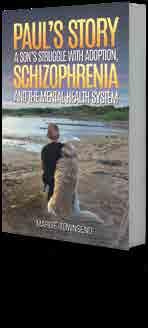
Mardie believes feeding problems and agitated behaviour in Paul’s first few weeks were a result of his mother’s use of modecate.
Paul enjoyed a happy and largely uneventful childhood, beginning with a family move at the end of 1979 to Mansfield, where Ron took up the position of Uniting Church Minister.
“’He’s gone.’ Hard words to comprehend and hard words to accept. It was July 1, 2016. My husband and I were in Lund, Sweden, where I had been presenting at a conference. Our daughter Ruth had rung us the night before to find out where we kept the spare key to our younger son Paul’s flat. She had been trying to contact him for several days, without success. Finally, accompanied by police, Ruth went to Paul’s flat where he was found, sitting peacefully on his couch, drug-injecting equipment on the table beside him, but clearly freed from his struggle with life.”
Mardie Townsend, ‘Paul’s Story’, page 13
It was near Mansfield that Ron and Mardie designed and built a house at Bonnie Doon, based on the concept of environmental self-sufficiency.
They still own the property today and, for Paul, it was often a haven in his adult years as he sought escape from his mental illness.
While some of Paul’s behaviour during childhood had been concerning, it was in 1997 that the first obvious signs of mental deterioration appeared, a year in which he had

18
Continued P21
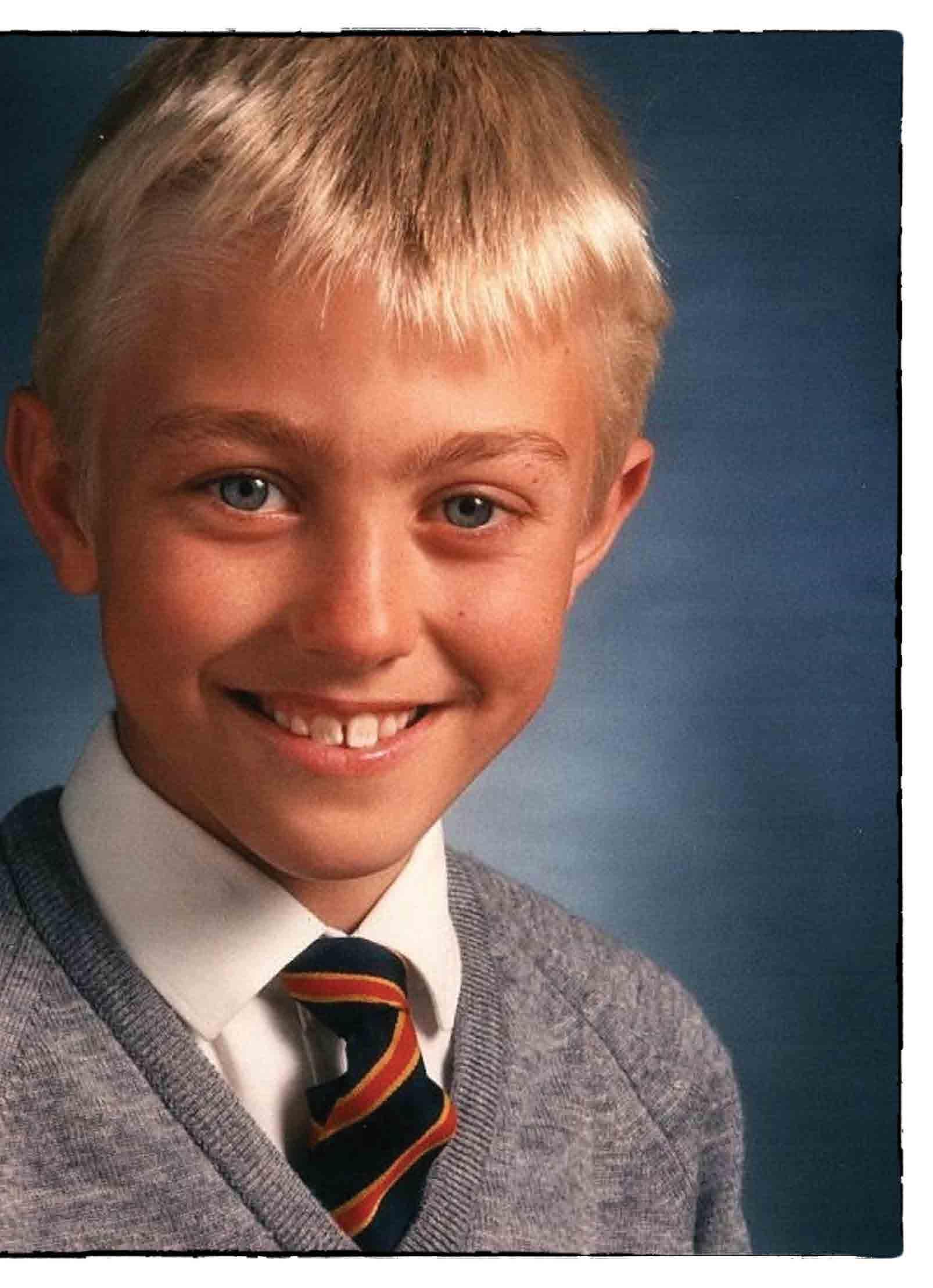
19
Statistics represent real people
By Rev Andy Calder
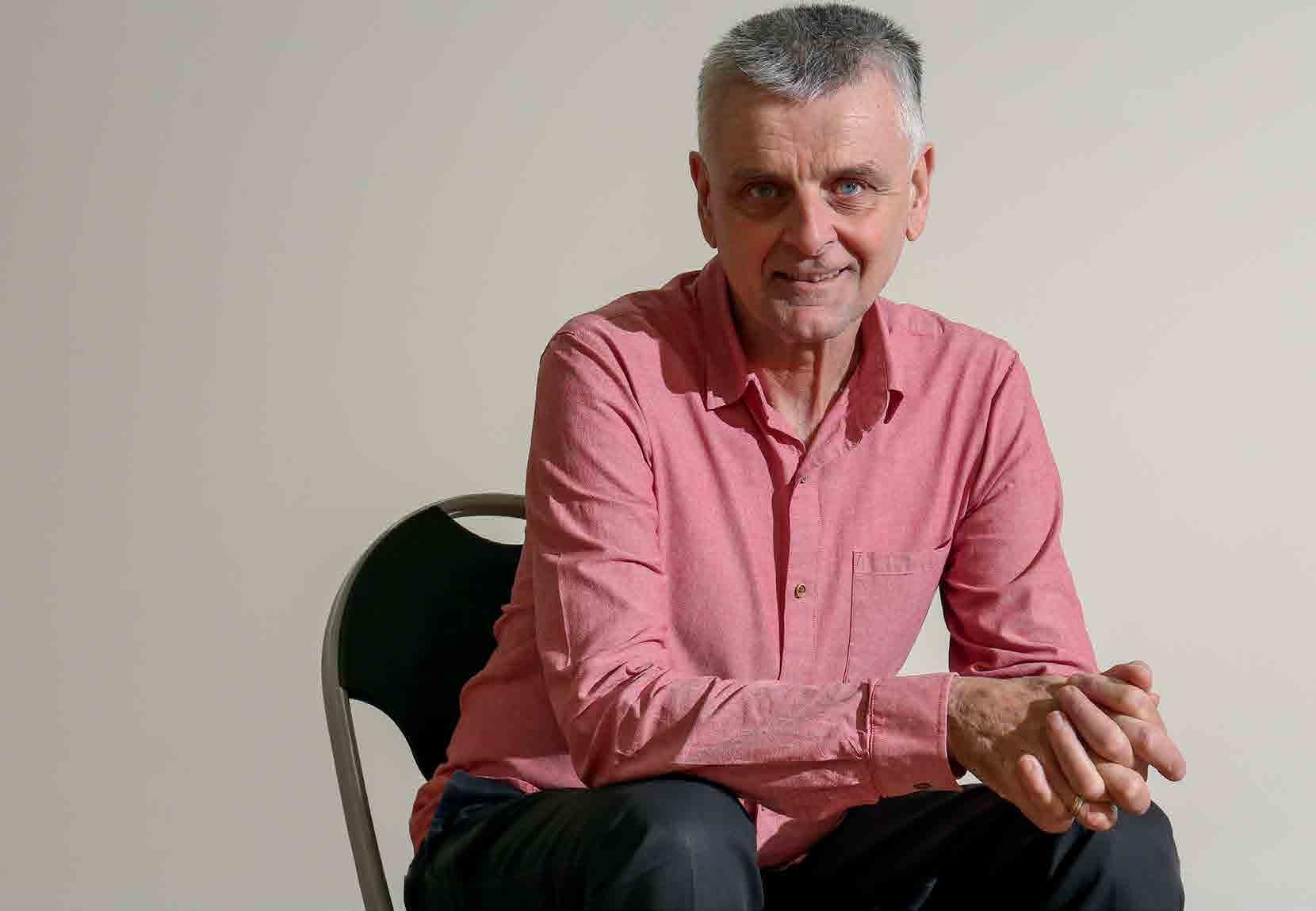
Mardie Townsend’s book, ‘Paul’s story: a son’s struggle with adoption, schizophrenia and the mental health system’, is an honest and moving saga of a family’s love and support for their son, and his struggle with identity and meaning.
It is also a saga of their struggle with the Victorian mental health system.
Mention in the book is made of Paul’s connections with various community groups, including the Uniting Church, and activities including Sunday School and the National Christian Youth Convention. Statistics tell us that 1 in 4 Australians will suffer from a mental illness at some point in their lifetime.
For some people this is a one-off occurrence, for some their illness is episodic, and for others their mental illness is life-long.
These statistics are not just numbers, they are real people, people who are members of a congregation, be it UCAF, youth group, men’s group, church council, or pastoral care group.
Some of these people are Sunday School teachers, ministers, committee members, and worship leaders.
They are also partners, friends, parents and children, and, like all illnesses, mental illness impacts on those who care
and support, many who also look to the community of the church for support, care and compassion.
There will be people in our communities of faith who never reveal to the community they have a mental illness and others for whom their mental illness is all too obvious because of the way their symptoms are manifest.
One of the burdens of mental illness is the stigma and fear. It is why some people fear telling others about their illness and it often affects the care we offer.
As Christians we need to ensure that we do not add to the burden and stigma of mental illness with bad theology.
Mental illness does not result from lack of faith, or a weak faith. It is not caused by turning away from belief or a lack of trust in God and it does not continue because the person has not prayed enough.
The Uniting Church Synod of Victoria and Tasmania, through its congregations, agencies, various missional outreaches and advocacy to government, has historically sought to support and welcome people labelled with mental health issues: people who so often have experienced exclusion and alienation in a range of settings.
This is inspired by the gospel imperative: ‘Do not neglect to show hospitality to strangers, for by doing that some have entertained angels without knowing it’ (Hebrews 13.2).
Supplementing the Church’s responses above, Synod submissions in 2019 to the Victorian Mental Health Royal Commission advocated for many of the changes called for in Mardie’s book, as well as greater recognition of spirituality’s importance in the lives of people within the mental health system.
The Synod has also produced a ‘mental health kit’ resource, designed to support congregations in their response to people with mental health issues.
Its aim is to enhance welcome and support, as well as acknowledging the gifts, insights and contributions people labelled with mental illness can offer.
Mardie concludes: “Paul’s life, perhaps more than most people’s, was lived through a mixture of sunshine and shadows”.
This painful story of lived experience is an honouring of Paul’s life and a poignant reminder that much more change is needed.
Rev Andy Calder is Disability Inclusion Advocate within the Synod of Victoria and Tasmania

20
Image: Carl Rainer
From P18
his first contact with his birth mother, a permanent resident in a Sydney mental institution.
Mardie suspects Paul’s distress at the situation involving his birth mother, and his use of marijuana to deal with that, was the catalyst for what were to become serious mental health issues for the rest of his life.
She recalls an incident around this time in which Paul was taken by ambulance to hospital after a psychotic episode in his bedroom.
“Despite his stereo being turned up to
Paul’s life, they say, was one filled with sunshine and shadows.
Shadows were cast by his abandonment as a child, his birth mother’s mental illness, and his own schizophrenia, but there was sunshine at times around
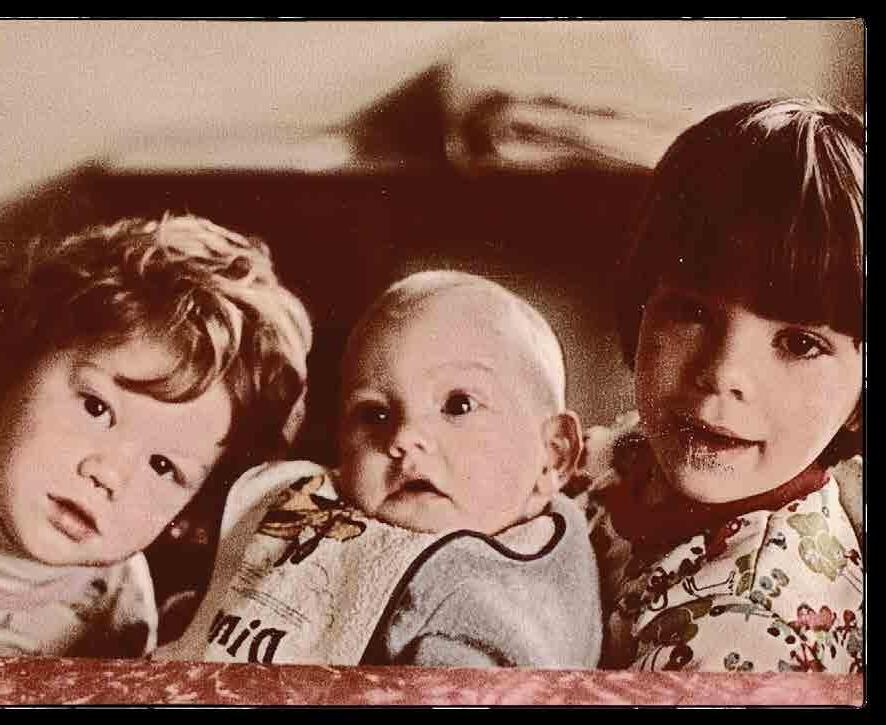
almost full volume, when I opened the door to tell Paul his dinner was ready, I could hear him wailing and keening above the music,” Mardie recalls.
“I still have a clear vision of him, wild-eyed and rocking backwards and forwards, seemingly unable to move from his couch, and reacting as though he was being attacked.”
For the next 19 years, schizophrenia was Paul’s constant and unwelcome companion, preventing him from reaching his full potential and achieving what he wanted in life.
This is what fills Ron and Mardie with the greatest sadness when they consider what might have been.

“The words ‘I love you’ said by my parents fell on deaf ears. By being handed to a family I was given a better chance, an education, a family, an extended family and every opportunity.”
Journal entry by Paul, August 2004
achievement and enjoyment, friends who stuck by him, and parents and siblings who loved him deeply.
Mardie admits, though, that life with Paul was lived on a knife’s edge as his schizophrenia worsened, never sure when and why he would lash out.
“Much of the time you never knew what was coming with him,” Mardie says
“I recall one time we had visitors from England around for dinner and we invited Paul over because he knew
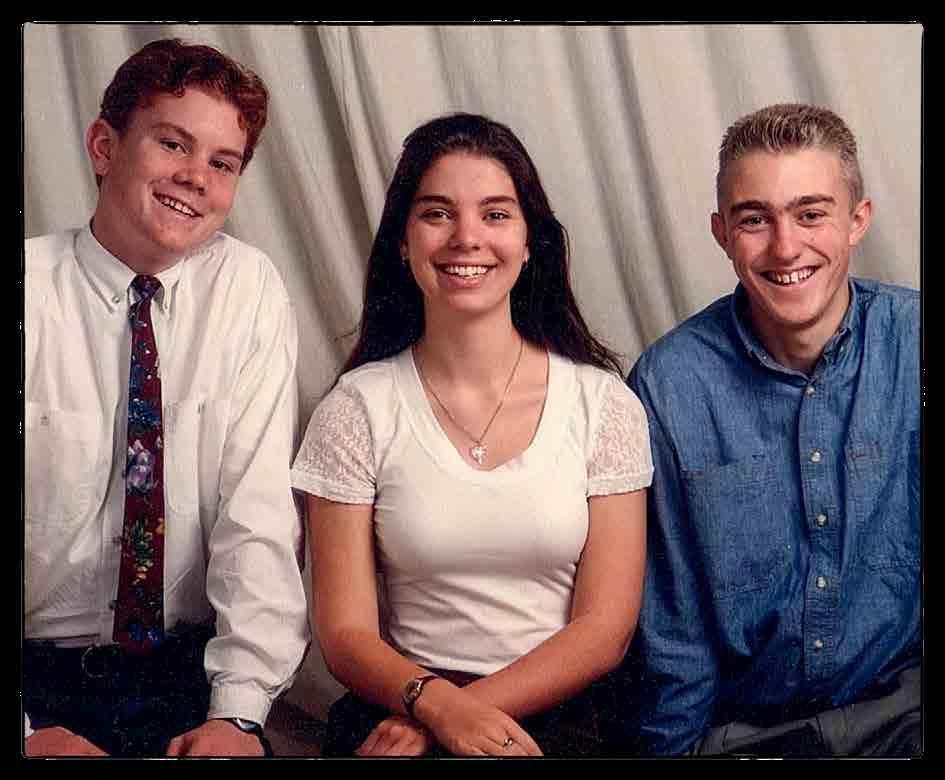
21
Continued P22
From P21
the daughter of this couple.
“So he came along and, at one point, somebody said something completely benign, which he misinterpreted and went completely off the handle about, and it became quite a stressful event.”
The uncomfortable truth, they say, was that Paul could also be violent, on one occasion punching Mardie as she drove him home from a meeting.
“I would say that Paul wasn’t by nature a violent person, but the voices and demons in his head sometimes became too much for him,” Mardie says.
It was during the most difficult times that their faith, and the support of their Church, carried Ron and Mardie through.
“I’m sure our faith was tested at times but it didn’t disappear,” Mardie says.
And for that she offers heartfelt thanks to the Ormond congregation, their Uniting Church home for many years.
“In a sense, our faith and our church community became absolutely pivotal in sustaining us,” Mardie says.
“We’re very active within the local church and that Ormond community is absolutely essential to us.”
That support, and the support of the wider community, helped them deal with
their grief when they said farewell to Paul at his funeral in 2016.
“Church Council secretary Heather Baxter read the parable of the prodigal son and I just sat there sobbing because it was such a remarkable elucidation of Paul and of how God is so loving,” Ron says.
“That love of God was there even more, despite this terrible tragedy of Paul’s death.
“Our Minister Andrew Boyle then spoke and he absolutely nailed this message around how our gracious God takes on board our suffering and enables us to rise through that suffering.

“I’m convinced that God will love my son Paul until the end of time.”
If one positive thing emerges from Paul’s death, Ron and Mardie hope it will be the opportunity to start a conversation around how we view people with mental illness and what better processes can be put in place to ensure they receive the best treatment possible.
“When we are at Bonnie Doon, I often go for a walk and pass by Paul’s cairn. I was chatting with Ruth recently and noting that, generally speaking, I am not experiencing the sharp grief I felt immediately after Paul’s death, but when I walk past his cairn I say (in my head), ‘hi Paul’, and he replies (in my head) ‘hi Mum’, his voice, his inflection and intonation all as clear as a bell. That’s when my eyes fill with tears.”
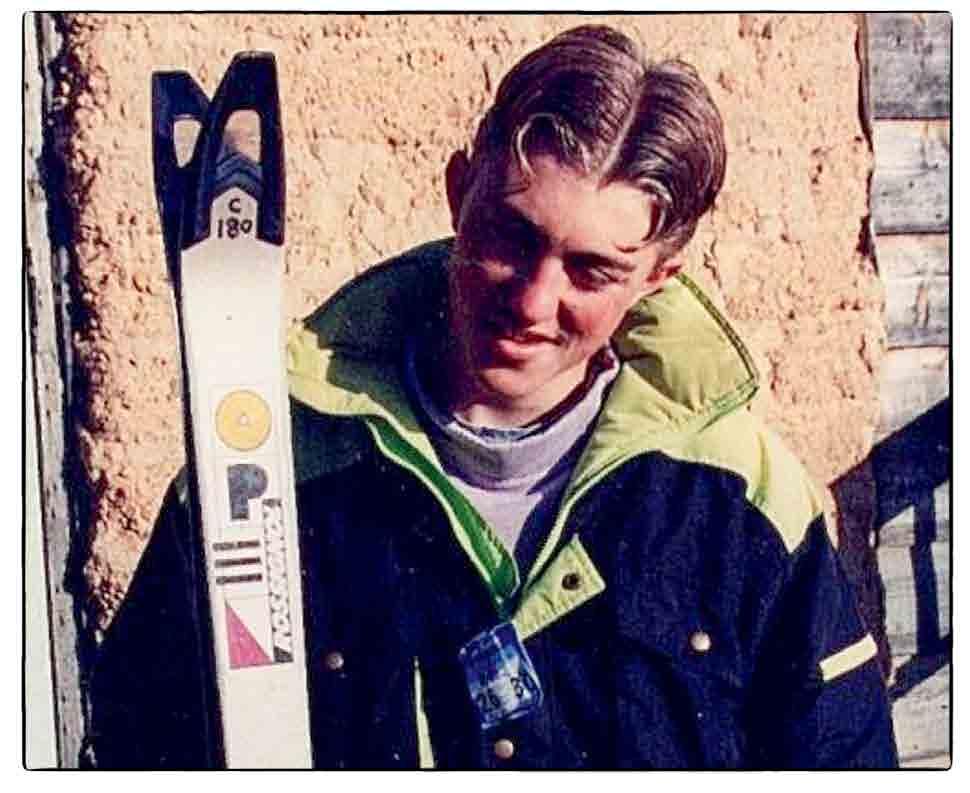
Mardie Townsend, ‘Paul’s Story’, page 110
Mardie’s book has thrust her into an advocacy role, and the story it tells has been taken on board by a number of universities, keen to incorporate it into their social work courses.
The book, she hopes, can be a small piece in a larger jigsaw puzzle representing change.
“I wanted to highlight the issues facing people in Paul’s situation, and their families, and to make readers aware that people with mental illness are real people, instead of just statistics and cases,” she says.
“I also wanted to draw attention to the state of the mental health system so that people might feel better prepared to deal with everything around it and press for improvement within it.”
As they reflect on Paul’s life, and death at the age of 37, Ron and Mardie take comfort in the fact that their love for him, though tested deeply at times, never wavered.
It is this that gives them solace when
22
Continued P24
Paul fell through the cracks
On the day that Crosslight spoke to Ron and Mardie Townsend, they were digesting the news of the death in New South Wales the previous day of a 34-year-old man with mental health issues.
The man, who had a long history of schizophrenia, was shot dead by police at a medical centre at Nowra after he approached them armed with a weapon.
For Ron and Mardie, such incidents immediately bring to mind thoughts of their son Paul, and what might have been if he had received adequate care and support during the final stages of his battle with schizophrenia.
When Paul was released from highlevel hospital mental health care and returned to his unit on June 14, 2016, they knew with almost complete certainty that it would not end well.
In fact, his discharge that day started a clock ticking towards his death, less than three weeks later.
On July 1, Paul was dead, found by police and his sister Ruth on a couch in the unit after a drug overdose.
Ron and Mardie acknowledge that hindsight is, as the saying goes, a wonderful thing, but firmly believe it was the lack of a carefully organised plan for Paul’s ongoing support and care upon his release that consigned him to his fate.
While Ron and Mardie have no issues with Paul’s treatment in hospital, it was that lack of a suitable plan upon his release that leaves them angry.
“On the whole the in-hospital care was done reasonably well and was as good at it could have been,” Mardie says.
“The issue is with the discharge process and post-hospital and community-based care.
“It's a patchwork approach, and very inconsistent.”
The truth is, they say, that Paul was
is no position to look after himself after seven months in a psychiatric facility and it was vital that he had proper support in those crucial first weeks after his release.
That support should have begun with a period of time in transitional care, before any thoughts of a return to his unit, they say.
Yet, to their astonishment, Ron and Mardie were told that not only would Paul be returning immediately to his unit, his only support would be two brief meetings each week at the regional authority’s mental health support
service, meetings which Paul would be required to make his own way to.
Paul didn’t just fall between the cracks because of that lack of support, he fell down a deep chasm which ultimately led to his death.
“Paul was discharged after seven months in hospital, much of that time in a locked ward,” Mardie says.
“We were assured there would be support for him when he was released but, in fact, there was nobody there for him, no crisis assessment team or any other team following him up every day.
“All of a sudden, he is out in the community and he has to walk to their facility twice a week to see someone.
“If they thought he needed to be in transitional care but couldn’t provide it elsewhere, then they needed to provide it in his unit.
“It seems that there's a big gap between people coming out of hospital and living in their own home, and it's an inconsistent approach, where some people get the care they need and other people fall through the cracks.”
Ron and Mardie say only a drastic overhaul of the mental health support system will mean there are less stories like Paul’s, and more about those with mental illness who are able to thrive once released from care into the community.
It also requires a fundamental shift in the mindset of the many people who already have a pre-determined view of those struggling with mental illness.
“I think so many problems arise because people look at those with mental health issues and say ‘oh, they’re nutcases or fruitcakes, it’s best just to ignore them and have nothing to do with them’,” Mardie says.
“But the reality is that mental health issues of one sort or another affect one in four people in their lifetime and that's a huge statistic.
“Just about every family at some point in their life will have to deal with mental health issues.
“The difficulty with mental illness is that we don't understand it and we judge people because of that lack of understanding.”
23
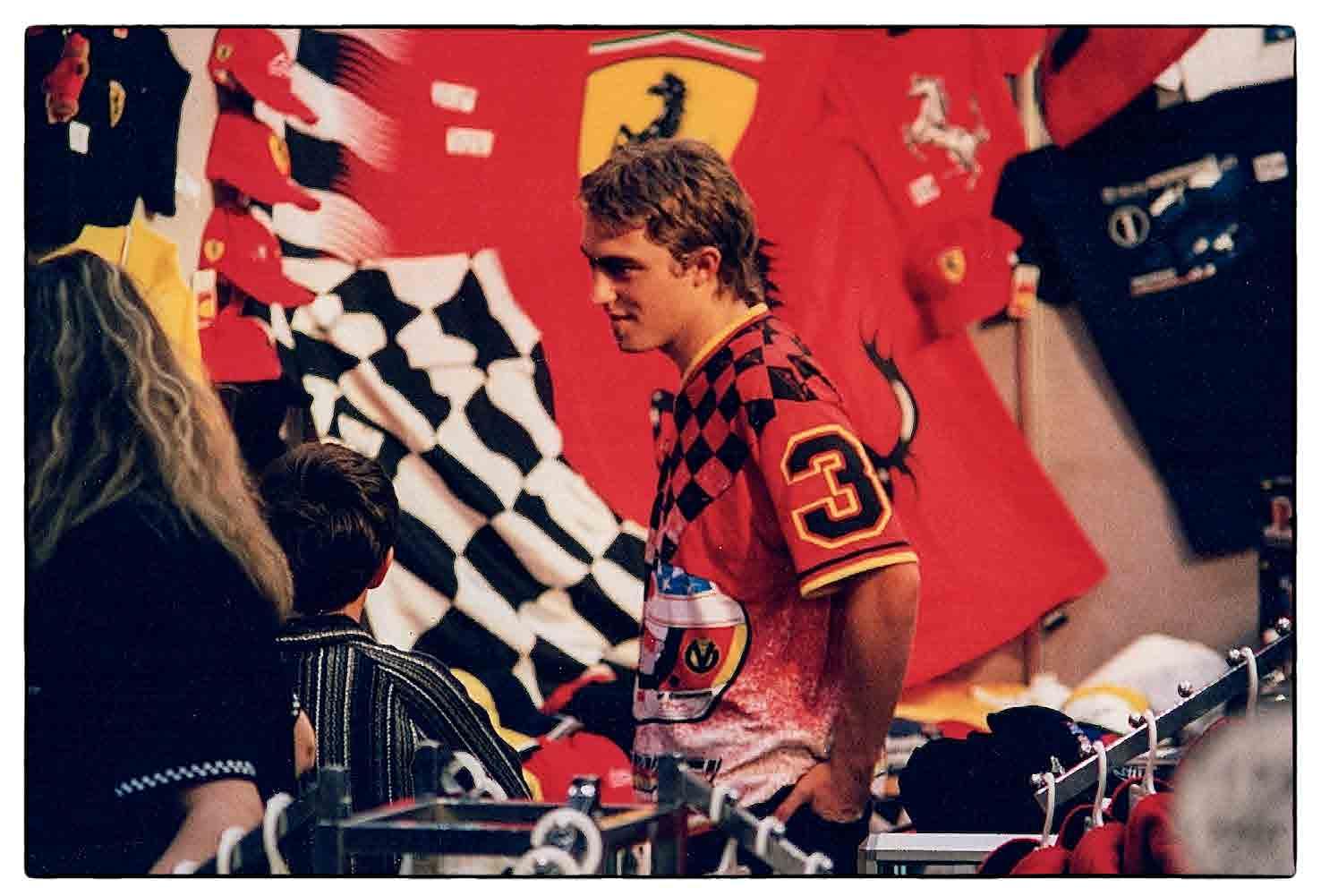
they consider what they might have done to provide a different outcome.
“I think every parent looks back on their role and says, ‘well, could I have done that differently?’ and there are certainly instances with Paul where we could have acted in a different way,” Mardie says.
“But if we look at an overall picture, Paul had a loving family who did its best to support him and cope with the challenges his mental health issues posed.
“We’re not perfect, but we did our best and it was pretty good.
“When Paul was not psychotic I’m sure he knew that he was loved

“He woke up determined to accomplish something small that day, a little step. In what direction he wasn’t sure. Being in limbo was neither here nor there. Here was a way off the beat. There was so far out he’s in, in where? Inside of him, in wherever. Like there was something going on in his subconscious or unconscious mind. Like
what was his subconscious or unconscious mind. This was something he worried about on a regular basis.”
Journal entry by Paul, undated
deeply by us, but in the midst of psychosis who knows what demons were in his head, and I think that’s the challenge with a disease like schizophrenia.
“In his own journal Paul writes that the words ‘I love you’ from his parents fell on (his) deaf ears, but I think he knew, when he was well, that he was loved by us.
“We loved him unconditionally and endlessly and, at times, that love was tested, through Paul’s abuse, derision, violence and disengagement, but it remained strong to the end of his days and still lives on.
“There was much to love
about Paul and he had such potential, but we never got to see the best of him because mental illness dominated him.”
Ron and Mardie want people to know what Paul meant to them and how mental illness robbed him of the opportunity to lead a full, and fulfilling, life.
“We only discovered relatively late in his life that Paul was incredibly artistic and some of his paintings were astonishing,” Mardie says.
“Paul was a talented, loving and caring young man who had abilities which were never able to be displayed to their full potential because of his mental illness,” Mardie says.
“That is true of so many people, and if we supported people with mental health issues better we would be unlocking enormous talent. The message is that with people like Paul we see their mental illness, but what we don’t see is the person, their talents and their strengths, and it’s time we opened our eyes.”
‘Paul’s Story: A son’s struggle with adoption, schizophrenia and the mental health system’ is available through Amazon, Booktopia and Benn’s Books in Bentleigh.
Help is available through Mind Australia (1300 286463), the Mental Illness Fellowship of Australia (08 8272 1018), SANE Australia helpline (1800 187263).
24
From P22
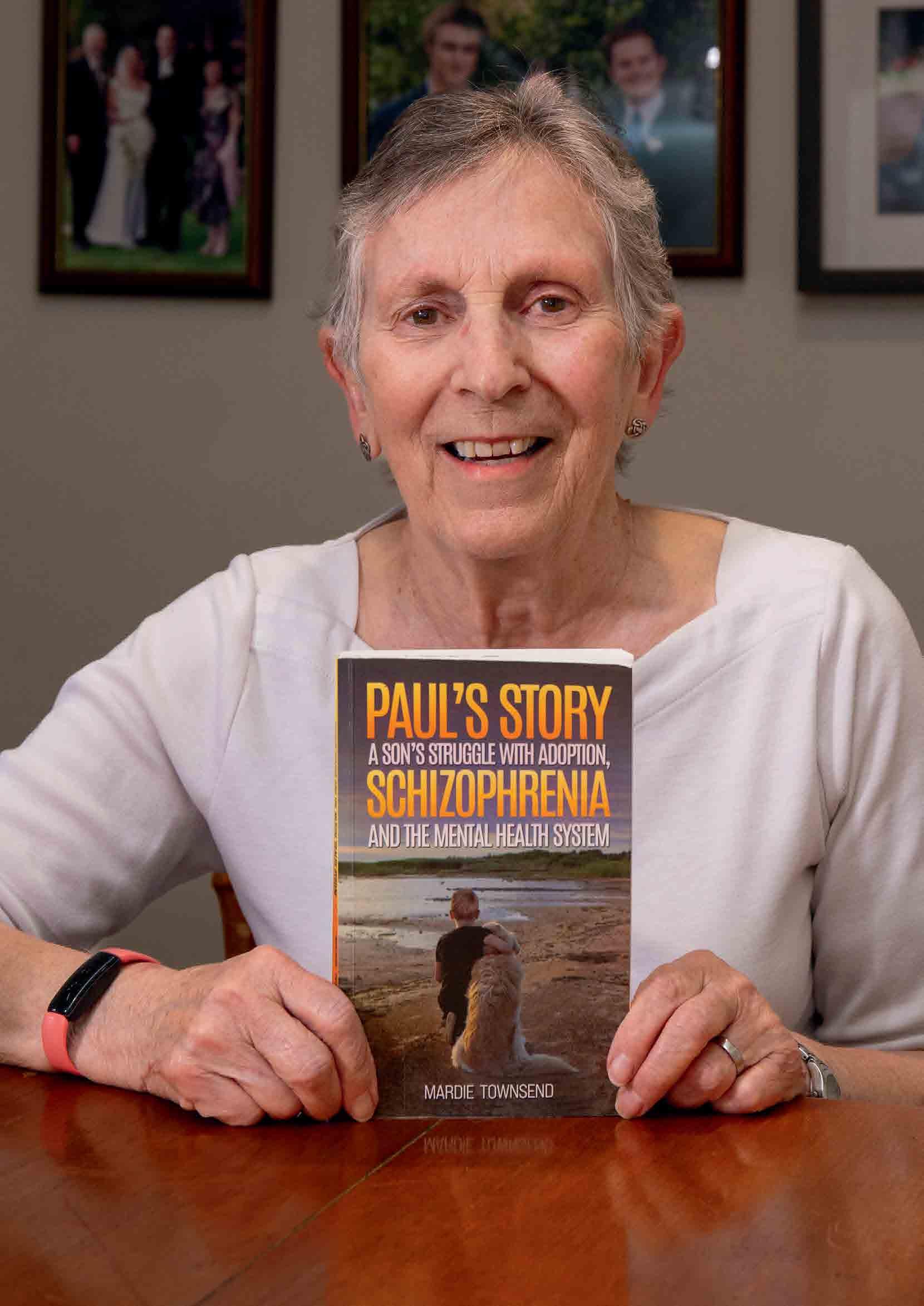 Mardie Townsend hopes her book about son Paul’s battle with schizophrenia will shine a light on the mental health system.
Image: Carl Rainer
Mardie Townsend hopes her book about son Paul’s battle with schizophrenia will shine a light on the mental health system.
Image: Carl Rainer

ON NEW faces
The equipping Leadership for Mission unit recently welcomed Rev David Kim and Rev Sandy Brodine to the team. David and Sandy spoke to Crosslight about what they bring to their respective roles.
Can you describe what your new role within eLM will entail?
David Kim, Multicultural Ministries Co-ordinator
The main role of Multicultural Ministries Co-ordinator entails the strengthening of culturally and linguistically diverse communities to actively engage in the wider Church by enhancing multi and intercultural ministries within the Synod of Victoria and Tasmania.
This is achieved in a number of way, namely by encouraging the ongoing formation of CALD ministers and lay leaders; enhancing the missional capacity of migrant communities; fostering the wider engagement of migrant communities and CALD leaders in the Synod; growing the cultural competence of Synod, presbytery and congregational leaders, and Synod processes; emboldening the leadership
and ministry of CALD women in the church; and identifying and resourcing further significant opportunities that assist the church to live out its multicultural commitments.
Sandy Brodine, Education and Strategy Co-ordinator
My new role is as part of the Younger Generations team, as Education and Strategy Co-ordinator. I’m excited to be able to help and encourage church communities around Victoria and Tasmania to grow their capacity as intergenerational faith communities where people of all ages, including children and their families, can come to faith and can grow as disciples of Jesus.
Can you provide a brief overview of what you have been doing until taking on this new role?
DAVID: I have served in various placements, including as a church
planter, church revitalised/rebuilder, lead minister, mission advocate, and a certified educator for training organisations. Each placement has nurtured me to embrace and implement different ways of serving churches and organisations in South Korea, the USA, China, and Australia.
I began my church ministry as a children’s ministry pastor in South Korea and, after moving to the USA for further training in ministry, I was mainly involved in next-generation ministries and inner-city homeless and domestic violence ministries. After being ordained as a Minister of the Word, I was called to revitalise local and migrant churches and faith communities in Maryland and California.
Upon returning to Australia, I discerned about planting a local church for Korean migrant communities, and a faith community was planted in Brisbane
26
Continued P28
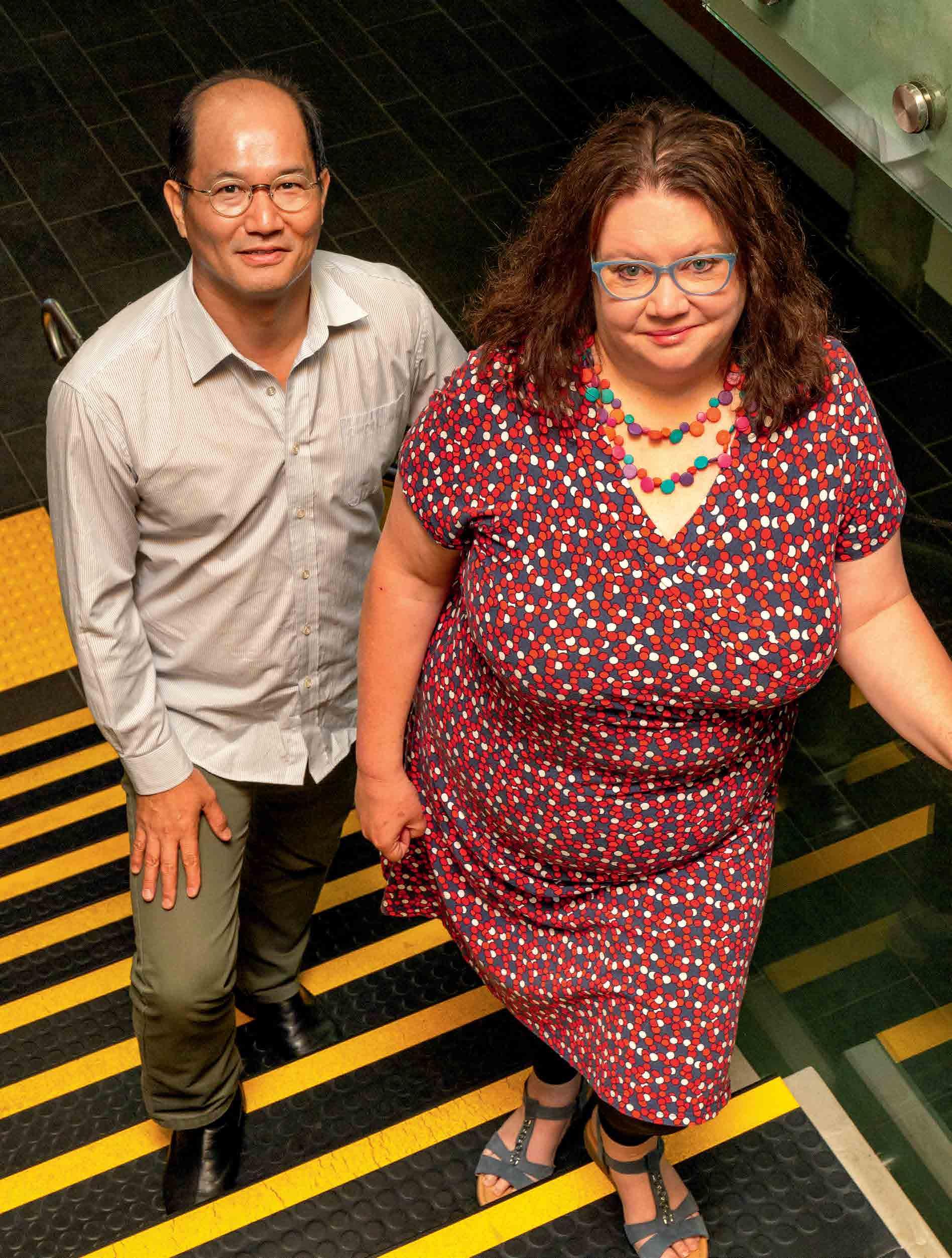 Rev David Kim and Rev Sandy Brodine bring a wealth of experience to the equipping Leadership for Mission unit.
Image: Carl Rainer
Rev David Kim and Rev Sandy Brodine bring a wealth of experience to the equipping Leadership for Mission unit.
Image: Carl Rainer
in 2006. During the process of planting faith communities in Brisbane, the Synod of Queensland welcomed and invited me to settle in the Uniting Church in Australia.
While I was supported to complete the ‘Reception of Ministers’ processes, I received training for better understanding of Australian churches and communities within and beyond the UCA, opportunities to build collegial relationships with local presbyteries, congregations, and colleagues, and invitations to get involved in various ministry and leadership areas within the UCA. Since then, I have participated in the life of the UCA as a member of several Synod and presbytery committees, and reference groups for worship and multicultural ministry. It was a great opportunity for me to understand and to make commitment deeper into the life and ministry of UCA.
SANDY: I come from a teaching background. I am a fluent speaker of Mandarin Chinese, and taught Chinese, English and Religious Education in secondary schools. I enjoyed taking kids on cultural and linguistic study tours to China, and also set up a St John Ambulance Division. I am a big advocate of experiential/real world learning.
Since my ordination 12 years ago I have been a part of the ministry team in the Banyule Network of Uniting Churches, where my role description has changed many times. I am most proud of the Fresh Expressions of Church that we grew from scratch there: A Messy Church, the Common Ground Community (an intergenerational Sunday morning community that meets in the Sycamore Tree Cafe) and the SPACE Contemplative Community. These growing communities are home to people finding their way into the church. We have also developed a ‘theology hub’ in conjunction with Pilgrim Theological College. Adults from across the generations (from 30 to mid 80s) have undertaken theological study, some for credit, and others as ‘audit students’. This has really enlivened their faith journeys and deepened our leadership teams in our Fresh Expressions communities.
Have your current roles prepared you in any way for the new role you are undertaking?
DAVID: My last placement was a typical local Uniting Church, which was monocultural, aged, small, and traditional. Moreover, the church paid minimum attention to the Presbytery and other bodies of the UCA.
I noticed a significant gap in communication between the church and the Presbytery, so I intentionally kept encouraging the Church Council members to get to know the Presbytery by inviting the Presbytery minister and mission officers to preach and holding a series of sessions for discipleship and leadership development for local churches. Later on, with the Church Council’s support and prayer, I was nominated and elected as a member of several committees of the Presbytery and the Synod. It became a leverage for me to keep the church members informed about the current news and matters. I would like to share my ministerial experiences to identify and embolden churches to grow to be multi-intercultural and to support their members in discerning a calling into ministry.
SANDY: I feel as though both my teaching career and my work with younger generations at Banyule have absolutely prepared me for this new role.
What do you hope to achieve in this new role with eLM and what makes you so passionate about it?
DAVID: The area I am passionate about is equipping and supporting CALD communities and leaders, both ministerial and lay leaders, particularly women and the next generations. I am committed to paving avenues for CALD leaders to engage in practising their ministerial, administrative, and spiritual leadership throughout wider churches. Supporting and empowering women and emerging leaders from CALD communities is another aspect of the role that greatly appeals to me.
SANDY: I am incredibly passionate about growing disciples and helping people deepen their faith in Jesus,
right across the age spectrum, but particularly with younger generations, who I have worked with my whole life. I am also passionate about helping people from right across the age spectrum engage in faith development together. My hope for this new role is to help communities across the Uniting Church in Victoria and Tasmania to seed new expressions where younger generations can be nurtured, or to slowly add intergenerational elements into our more traditional liturgical styles of church. Even small changes can create a more welcoming and faith enlivening environment.
What might some of the challenges be in the role? And possibilities?
DAVID: The prospect of working with CALD leaders and congregations is challenging because there are diverse traditions among CALD churches and different educational and denominational backgrounds for church leaders. However, this role truly excites me because I am one of them, which means I intimately and genuinely understand their joys, hopes, needs, and struggles. Therefore, the first important step would be to listen to their stories and learn the reasons why they do what they do. To do so, I need to create a safe and welcoming space for CALD churches and leaders where all may sit together to communicate with each other.
SANDY: I think the biggest challenge is the prevailing language of a ‘dying church’ and the fact that three or more generations are now missing in many congregations. I’m looking forward to working with communities who are interested in making small changes, and planting tiny seeds that might grow into healthy communities over time. If you’re keen … please give me a call. My experience in both teaching religious education and working with younger generations at Banyule is that there are many people who are very keen to explore ideas of spirituality and Christian faith. Young people are often very passionate about social justice and making real change in the world. I look forward to finding ways to tap into that.
28
From P26
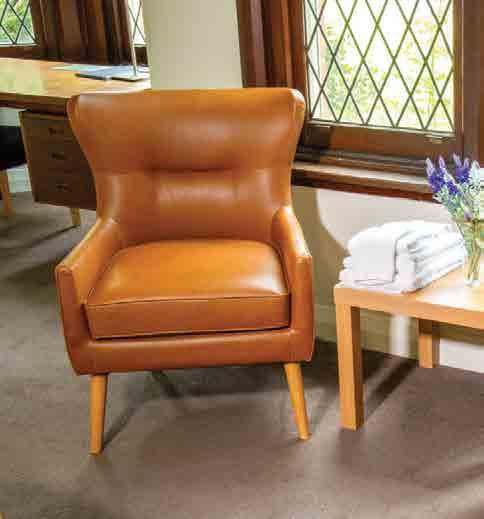
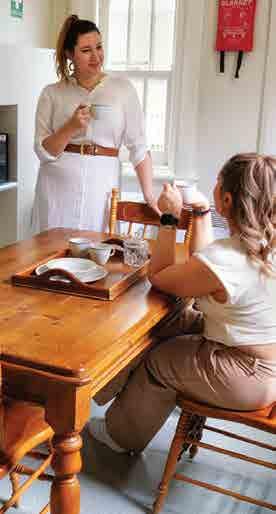






















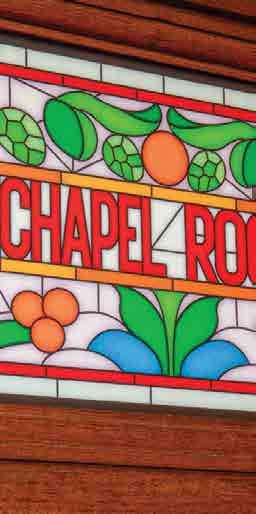
29 Your affordable home away from home is now even more comfortable than ever. With new beds, new lounge furniture, more queen rooms and more. Maclean House – conveniently located at: The Centre for Theology and Ministry 29 College Crescent Parkville. For bookings or further information: Ph: 9340-8800 or visit victas.uca.org.au You can make an ongoing difference. By giving a monthly gift of just $20 a month, you can make a big difference to a family in crisis. When becoming a regular supporter, you can support a program of your choice, helping individuals, families and communities across Victoria and Tasmania. Register today to become a regular supporter. Call us 1800 668 426 Visit unitingvictas.org.au/regular-giving Uniting is the community services organisation of the Uniting Church in Victoria and Tasmania.
are for That’s what
Reaching out to others can transform your life, so let’s make 2024 a year to say goodbye to loneliness and hello to friendship and social connection.
By Cathy Withiel
Three mornings a week, Verley MacGregor runs into the waves at Mount Martha with a gathering of women friends, all howling like wolves.
Verley is a member of Sea Wolves, a group of up to 80 fun-loving women who arrive at the beach early, form a circle and hold hands.
Then they count down from three and, howling at the top of their lungs, run into the waves for a bracing swim.
“It’s an exhilarating experience and great fun,” Verley says.
“We all look out for each other, it’s a great group and we’re all good friends.”
Verley knows it’s also important for her husband, Bob, to have a social outlet with his circle of friends.
Bob, who has Alzheimer’s disease, has a government-funded home care package through Uniting AgeWell and receives personal care, among other services.
He also attends the Andrew Kerr Care Centre day program in Mornington twice a week, which gives Verley the opportunity to go out with her friends.
“Bob has a lovely time,” she says.
“He looks forward to going and loves
the friendship and all the activities, and of course the wonderful lunches.”
These are the magic words: friendship, inclusion and fun.
Humans are social beings and, like sea wolves (which as it turns out are native to Vancouver Island), we were never meant to be socially isolated.
This truth is reflected in Uniting AgeWell’s Mental Health and Wellbeing Framework, which outlines the approach and measures the organisation is taking to support the mental health and wellbeing of its customers and staff.
This year, it is rolling out its mental health education and training program to about 4000 staff, enabling them to build mental health awareness and resilience.
This will, in turn, support the organisation’s 16,000 customers and the broader community.
The organisation places mental wellbeing on the same footing as physical health.
Uniting AgeWell General Manager Victoria, Vicky Jacques, says research shows that as you age, life can throw you a curve ball, including not being able to

Bob and Verley MacGregor love the support Bob receives through Uniting AgeWell.
30 Continued P32
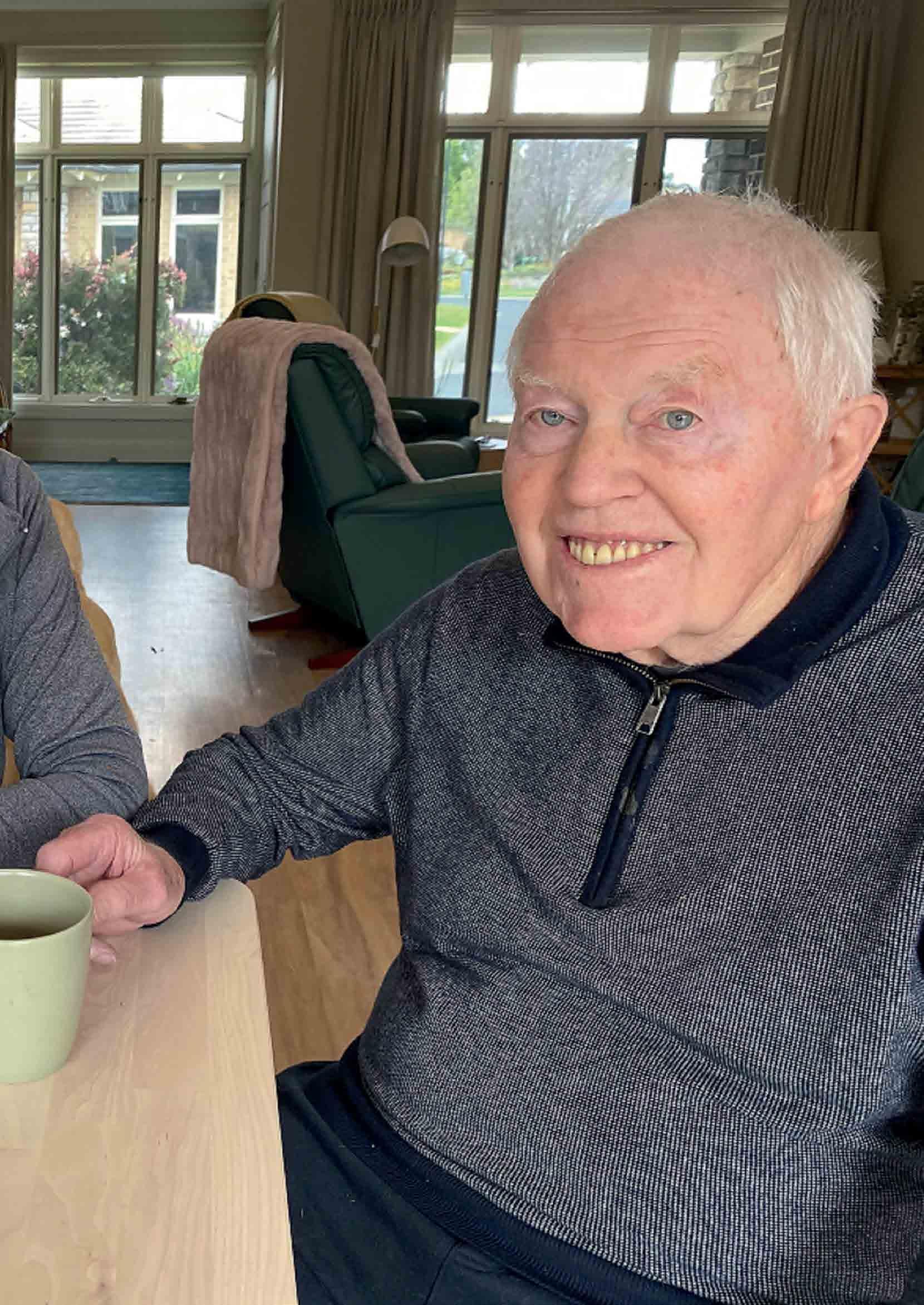
drive any more, retirement or the death of a loved one.
Older people’s mental wellbeing can be affected by these age-related changes, including social isolation.
Other measures Uniting AgeWell is taking to help reduce loneliness include:
Embracing new technology that connects older people with friends and family;
Establishing a suite of programs in residential and home care settings to reduce loneliness and increase inclusion and a sense of purpose;
Using Do Be Feel Cards, specially developed by Uniting AgeWell and Swinburne University, to encourage people to open up about how they are really feeling; and
Offering social connections programs to help people socialise.
Uniting AgeWell’s commitment to reducing loneliness is backed by its research into the role of technology in helping to achieve this.
Just ask centenarian Alex Reid, who has five generations of his family at the touch of a button on his iPad, thanks to the Dossy trial he’s taking part in.
Dossy is an easy-to-use video-calling app that has been designed specifically for low-vision, low-tech and hearingimpaired users.
It also includes Community Connect, a function that enables the user to connect to a volunteer for a chat.
The trial is being conducted by Uniting AgeWell with the University of Melbourne, Dossy and Ageing with Grace, through funding from the Aged Care Research and Industry Innovation Australia (ARIIA) Grants Program.
Alex, who used to work as a cabbie, is never happier than when he’s chatting to family and friends and swapping stories, like his favourite yarn of how he met his late wife, Betty, at the skating rink.
“I had my eye on her all night, then I decided it was time to sweep her off her feet, literally,” he says.
“I got my mate to knock her off her skates and then I helped her up like the hero.
“We got married three weeks later.”
Ground-breaking research by Flinders
University, in partnership with Uniting AgeWell, is shaping the lives of older people in Australia, after its findings were introduced as part of best practices in aged care.
The ‘A Good Life – Outcomes Measures’ research project concluded in 2022 and looked at what determines quality of life for older people living at home and in
aged-care facilities, as well as developing quantitative tools to measure an individual’s wellbeing levels.
The research identified the top six findings in pursuit of happiness, two of which relate directly to social inclusion: Social connections – support and connection with family and friends, and carer support.
Activities – group and independent activities, making new friends and social contact.
Italian-born nonna Connie Natoli doesn’t need a definition of happiness to know what it is.
She’s a regular at Uniting AgeWell’s Linlithgow Centre in Ivanhoe and says chatting and laughing with friends over coffee and pasta is more of a tonic than half the stuff you buy from the health store.
“We are so supportive of each other,” she laughs.
The bigger picture
UnitingCare Australia is an agency of the Assembly of the Uniting Church and the national body for the church’s community services network, the UnitingCare network.
This comprises 20 organisations across Australia, including Uniting AgeWell.
20 organisations across Australia
UnitingCare Australia is one of the founding members of Ending Loneliness Together (ELT), a national network of organisations that have come together to address the growing problem of loneliness in people living in Australia.
Many of the organisations within the UnitingCare network provide services that work towards addressing loneliness and social isolation, including those provided by Uniting AgeWell.
“If you’re feeling a bit down, someone will always cheer you up.
“You don’t stay feeling sorry for yourself for long.”
Penelope Anderson, who oversees operations at five AgeWell centres across metro Melbourne, including the Linlithgow Centre, firmly believes that social connection is the glue that holds us all together.
“I’ve seen some clients who are anxious or depressed and lonely when they first come to the groups,” she explains.
“Some aren’t eating well, others just want to have a reason to get out of bed in the morning, to have some people to talk with and to share their news with.”
You don’t have to attend centres.
There are numerous examples of lasting friendships formed between social connection clients and volunteers who visit them at home or chat to them over the phone, friendships that help fill the void through sharing stories and interests.
Social isolation does not necessarily affect only one person living on their own: it also extends to couples and families who depend solely on each other for companionship.
This is mirrored in the personal
32
From P30
account of Barbara and Kelvin O’Brien, who are enjoying a new lease on life since they joined a social connections group at Chadstone AgeWell Centre (St Mark’s) a year ago.
Neither of them drives and Uniting AgeWell arranges for their transport to the centre.
Kelvin loves joining the activities, while Barbara enjoys the group walk around Jells Park, followed by coffee.
Every second week they go on a bus outing to places of interest in Melbourne.
“We really enjoy ourselves,” Barbara says.
“We chat, play cards, they run trivia quizzes, we do exercises, there are singalongs, and we sometimes play darts and bowls.”
Everyone recently turned out in force to help the couple celebrate their 66th wedding anniversary at the centre.
Their daughters sent a heart-felt thankyou email to staff at the centre saying, “Our parents were so active before COVID-19 and were never home due to all the activities and socialising they did.
You have given them a reason to get up each morning … they have now got a balanced life … we have noticed the complete change in their demeanour and the way they are happy to be part of your special group.”
A harsh reality is that a number of older people don’t have family or friends nearby or at all, explains Uniting AgeWell Lifestyle Director Sharon Levey.
And when they retire, the social orbit of their world can shrink even more.
“I have seen many people absolutely flourish when they enter residential aged care,” Sharon says.
“All of a sudden they are surrounded
by people who care for them, there is always someone to talk to, and they feel part of a wider family and like they belong.”
Uniting AgeWell’s independent living villages also create a sense of belonging.
Residents say the villages provide the best of both worlds, namely independence and a shared community.
Many hold group lunches and barbecues, trivia evenings and card nights.
Friendships are forged and the extra support network provides great peace of mind.
Friendship, in whatever form, is just a phone call or click away.
For more information, call Uniting AgeWell on 1300 194074 or go to our social connections page at https://www. unitingagewell.org/our-services/ social-connections
33
Supervised/Clinical Pastoral Education (CPE) is a program of education and formation for pastoral care. The program uses the action-reflection model of learning, influenced by “theology from the living human document” (Anton Boisen). It is an entrylevel requirement for most professional pastoral/ spiritual settings. equipping Leadership for Mission Priorities, Focus & Advocacy Uniting CPE-The John Paver Centre is o ering a program August 5 - December 3, 2024. Supervisors are Roslyn Wright and Sarah Puls. Applications close May 31, 2024 For details and application form, contact Andy Calder 0417 562 556 or Lauren Mosso 0400 569 330. Supervised/Clinical Pastoral Education (CPE) Program August 5 - December 3, 2024. 240221_CPE
A
week in the l ife
Of
Rev Michele Lees, Echuca Moama Uniting Church Minister
SortMonday: withfinancialoutissue treasurerchurch
DAY


























Monday is my official day off, although today began with a brief phone call from our church treasurer. We needed to sort out a financial issue which we spoke about yesterday. Monday is his day in the church office, so I understand that sometimes these calls are needed.




FRIDAY SATURDAY









Each day I like to start with quiet time. I use a Celtic Psalter and With Love to the World to guide me through the lectionary readings for the week. This morning the psalter speaks of wisdom
and drawing on wisdom in the day’s busyness. The lectionary reading is from Isaiah, my favourite Old Testament book. A well-known verse, chapter 40 verse 31, strikes me, ‘but those who wait for the Lord shall renew their strength, they shall mount up with wings like eagles, they shall run and not be weary, they shall walk and not faint.’ I am feeling tired after a busy long weekend, and this verse encourages me that I will regain my energy. It also gives me an idea for a song on Sunday. My favourite time of my day off is spending time by the Campaspe River only a short walk from the manse. While by the river, it is quite easy to get lost in this other world and not be distracted by vehicle noise on the nearby roads.
MONDAY TUESDAY WEDNESD


34
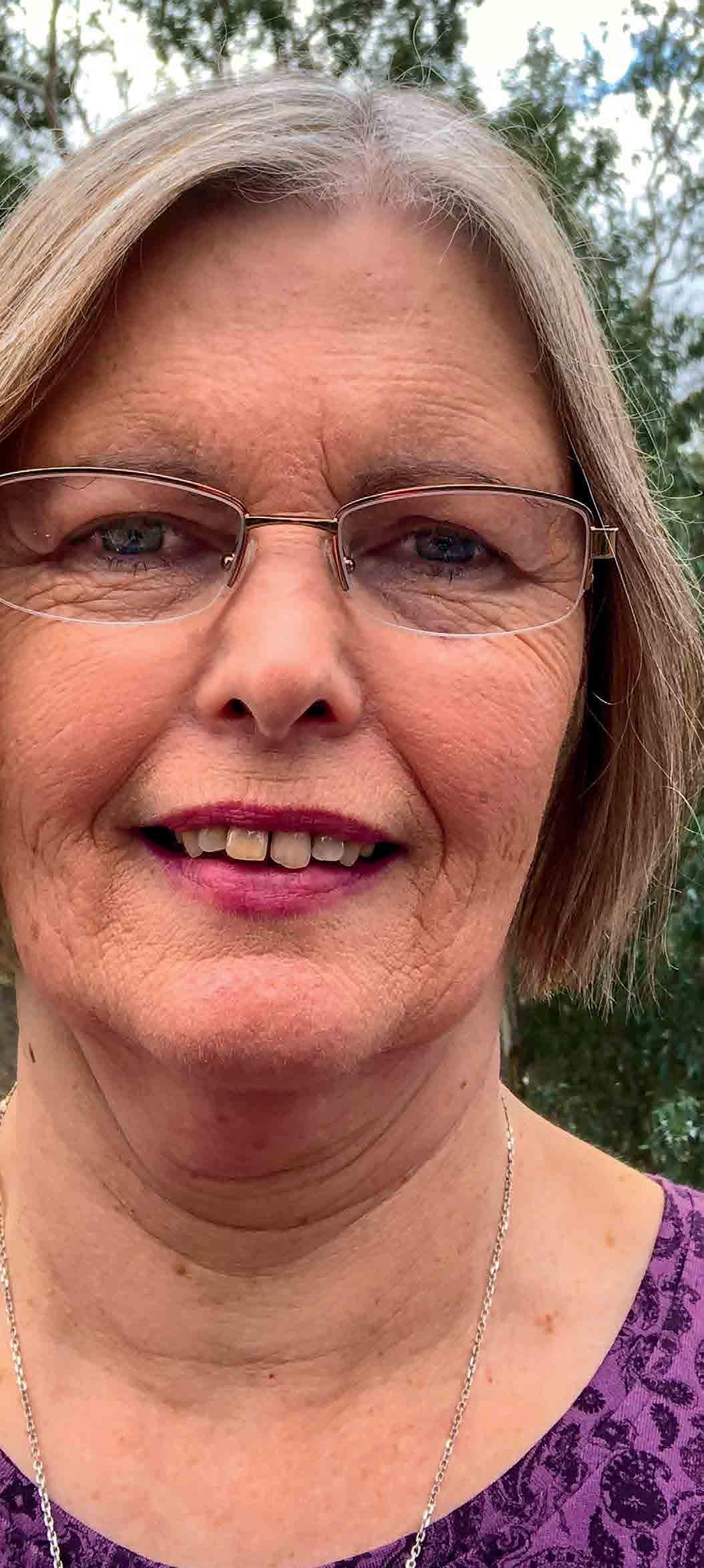
Tuesday: Prepareforthe communitylunch



















SATURDAY




The alarm goes off and after listening to the state and then local news it is time to get up. My prayer book refers to Psalm 82 and maintaining the right of the lowly and rescuing the weak and lonely. It is Tuesday, the day our congregation, with the help of community members, puts on a community lunch. The lunch prior to Covid attracted those passing through the town and rough sleepers by the river, but now we mainly attract older members of the wider community who come for a good two-course meal and friendship. All we ask is a gold coin donation, but we are unlikely to refuse anyone.
My Bible reading for this morning is the healing of Peter’s mother-in-law. I am reminded of our trip to the Holy Land in 2018 where we viewed what was believed to be relics of Peter’s home underneath a very impressive Catholic Church building where we worshipped with our Catholic travelling companions.
This Sunday we will celebrate Covenant Sunday with Holy Communion. I need to be careful to make sure that the worship service doesn’t go for too long. I check out resources. As it approaches midday I head off to the church. Our office person is having trouble with the printer and at a quick glance I cannot fix it.
At the lunch I sit with two women from STEPS, a group which meets Wednesday to Friday in our church. It is part of the ‘Hands on Help’ group for those on low incomes. One woman has been suffering long Covid for over a year; the other is considering retiring as STEPS treasurer after 10 years.
Back in the office, I solve the printer issue and I can print off the handout for the covenant service.
When home it is back to emails and worship preparation. I decide to initially concentrate on the aged care services for Friday, with one including Holy Communion. With help from worship resources, I put together a half-hour service. Then it is back to Sunday’s service.





TUESDAY WEDNES
35 Continued P36
Y
Wednesday: potentialResearchlaptop purchase
Thursday: prepare Sunday'sfor proclamation
worshipFriday:Lead athomesagedcare




















WEDNES








SATURDAY

















I wake early and start mulling over in my mind a concern about our community outreach program. I need to follow this up and hope to speak to the appropriate people in the next few days. After speaking to my son who works in IT, I may need to purchase a new laptop. Some research will be needed here.
During my quiet time I am encouraged to seek out the beauty of God in creation today, and from Paul’s first letter to the Corinthians, I ponder the questions, ‘Am I a stumbling block to anyone?’ and ‘How?’
After going through emails and responding to one concerning when to celebrate the arrival of our new grand piano at the church, it is time to take my car to be serviced.



Once home I spend more time intentionally with God, listening to music and reading reflections on the necessity of rest to restore ourselves to who God made us to be.




TUESDAY WEDNESDAY THURSDAY



I wake with the alarm after a good night’s sleep. Today my prayer book encourages me to trust in God to give me what I need for the proclamation on Sunday. At present I am torn on which way to go. The Corinthians reading makes me wonder how flexible I am in connecting with others.
More time is spent on emails and working with the latest video of our church activities, then off to spending time with God to consider Sunday’s proclamation and go over the service. As always God is faithful, and helps me bring together new things and old.




As Convenor of the Discernment and Candidates Committee, I consider a discernment plan submitted by a Church Council-supported member from a congregation in the Presbytery. And then it is onto reading a report from Property Services regarding the heritage restoration of our church building. Church Council needs to decide on how much we can afford.
After lunch I take a walk along the riverbank to the sounds of kookaburras and wind whistling through the trees. Back at my computer I view the latest video of our church activities. We are showing these before worship so that all members are aware of what happens at the church during the week. Then it is back to preparing for Sunday’s worship.




There are computer issues again, but I eventually get to work on the PowerPoint for Sunday and communicate with our Period of Discernment committee and candidates. I spend the rest of the afternoon working on the PowerPoint, researching laptops, and going over tomorrow morning’s two services.










SUNDAY MONDAY TUES








FRIDAY SATURDAY



Up at my regular time and this morning in my quiet time I am reminded that God’s glory can be seen in the ordinary events. I expect to see God’s glory as I lead worship this morning and chat with the residents of the aged care home and the independent living houses.
We have about 25 at the aged care home this morning, down on preCovid numbers of near 40, but still, it is a good gathering and a wonderful opportunity to catch up with the many Uniting Church members who live here. I spend time grieving with one woman



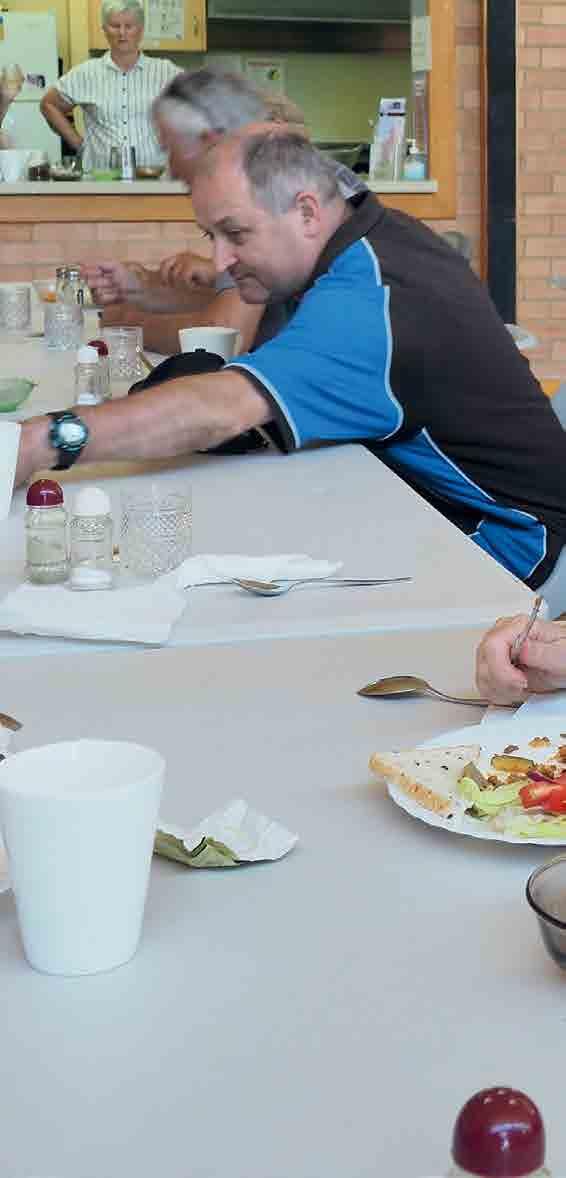
over the loss of her daughter and the loss of her home and precious garden. Another resident has recently moved in and grieves for the loss of her husband six months ago while still adjusting to leaving her home of many years.
Then it’s across to the community centre where we hold a worship service for the more independent residents. Today 16 gather, but we are missing a few of our regulars. We have worshippers from all denominations attend both services, and I organise to visit one of our members when I am back from leave. Before lunch I ring a member of our outreach team to discuss a concern I have. She is understanding of what I am thinking, and I tell her I will continue to check on my concern.
36
P35
From
Saturday:Finetunesermon andreview servicedetails
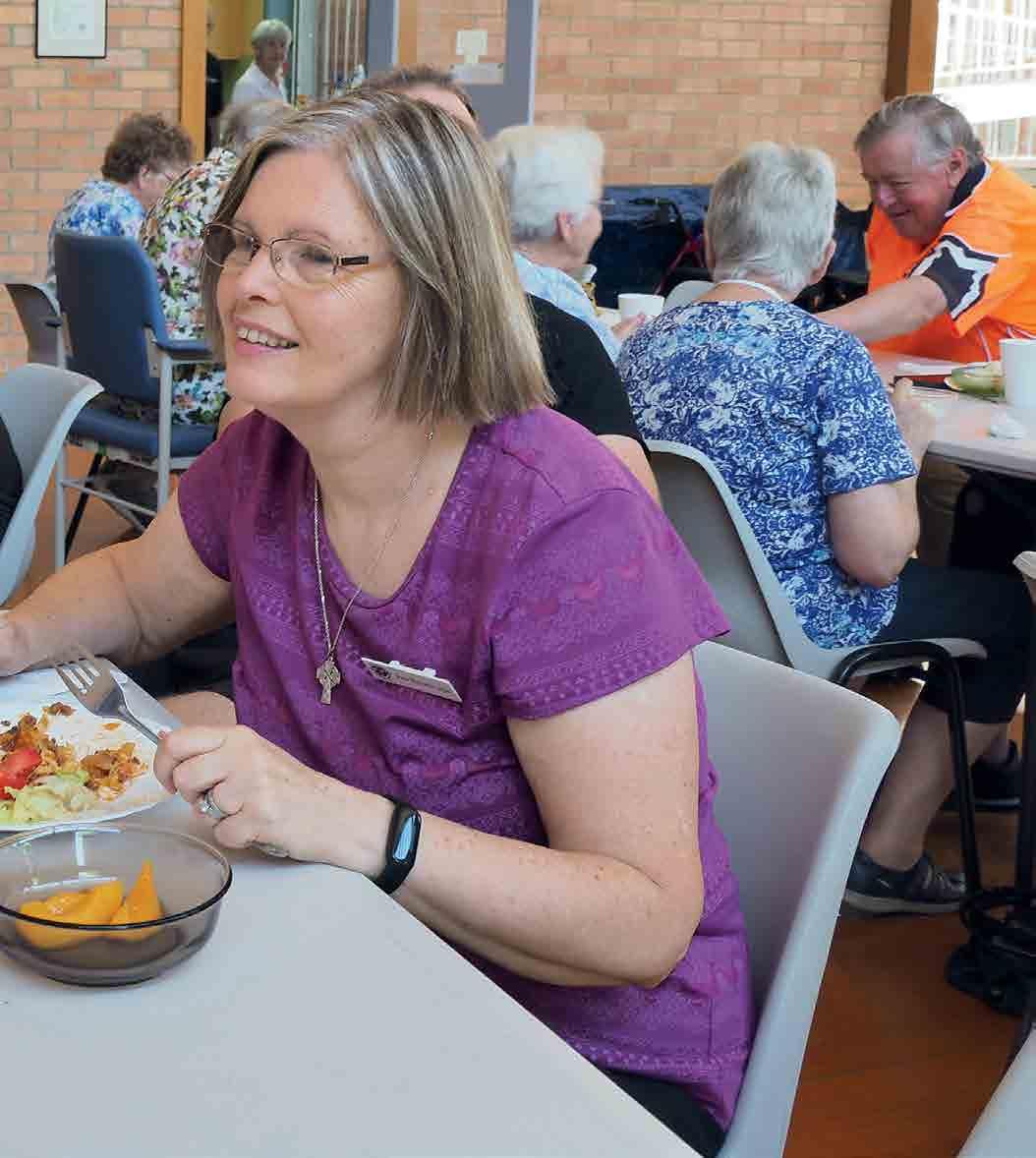
Sunday: pastoralProvide care and plan future events post- service

















During the afternoon I consider purchasing a new laptop, ring a member who is feeling down, and spend time writing a Minister’s report for our AGM.






DAY SATURDAY









I don’t need to get up so early today, but there are plenty of things I want to do. Following a quiet time and putting on the washing, I have breakfast and pore over yesterday’s local paper. Then it’s time to adjust my sermon with a thought I had originally.
I add our latest congregational video to the PowerPoint, and no matter how





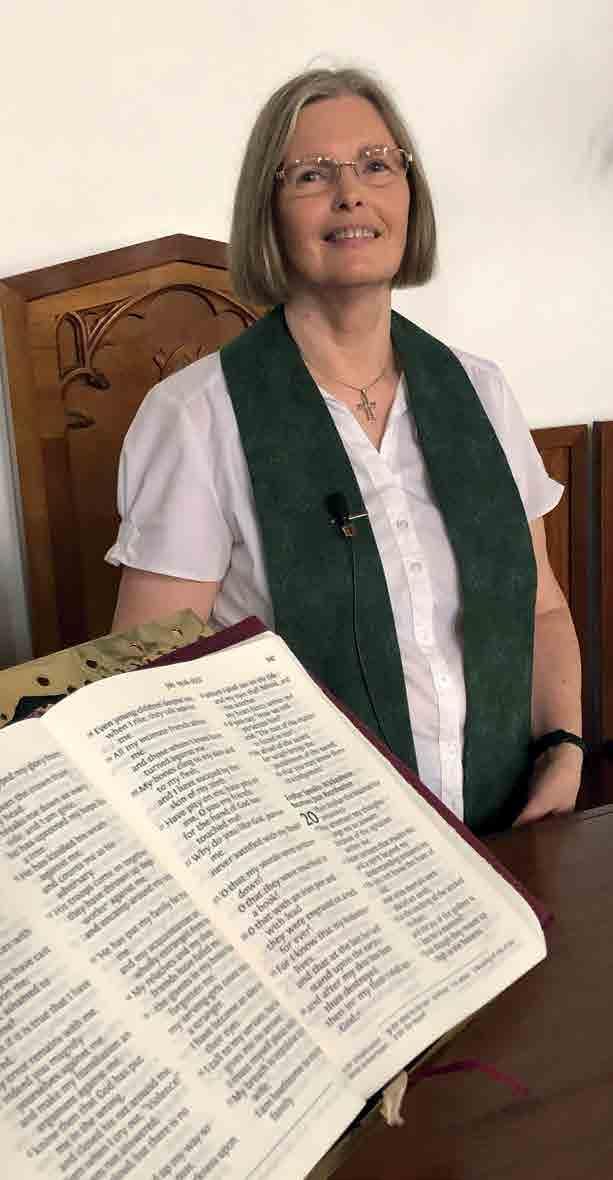
many times I check over the service, there always seems something to improve on.








MONDAY TUESDAY WEDNESDAY THURSDAY









Today is forecast to be 40 degrees and even with cooling in the church I decide that it is too hot to wear an alb for Holy Communion. Instead, I wear a white shirt with a green stole for Epiphany. Following a quiet time and checking over the liturgy and PowerPoint it is off to the church, where I catch up with those who I think need a chat.
Today is our first Sunday with our



new grand piano and we are very pleased with the sound. The worship service with the covenant service and Holy Communion goes well and does not finish unacceptably late. Following worship, I give a handout to an Elder who will take part in a coming baptism, and a few of us talk about suitable story books for worship. It is then downstairs for a cuppa, or for me, some cold water.








SUNDAY MONDAY TUESDAY






I speak with one member whose sister has not been well, another who is an apology for our Church Council meeting tomorrow night, and I arrange with our Elders’ leader to hold an afternoon tea at the manse on the first Sunday in March. Then it’s home to unpack all my gear from worship, have lunch and catch up on a written commitment I have.

FRIDAY SATURDAY



37
Congregation gives generously
Koonung Heights Uniting Church Minister Rev Heather Hon considers herself extremely fortunate to be part of such a warm and generous congregation.
That warmth and generosity is displayed on a regular basis as congregation members contribute to the wellbeing of their neighbours, outreach mission projects, and the broader Church in caring, generous and faithful ways.
Aligned with that is a deep and abiding commitment to social justice, and to the concept of Faithful Giving.
“Some congregations struggle financially, and with resources, but we are blessed in that we are able to contribute well,” Heather says.
By Talitha Fraser
products every week when the offering plate goes around the church,” Heather says.
“Our community members also cook in their kitchen and package up meals.”
The congregation also supports Mission Aviation Fellowship through its Fuel for Father's Day program, which keeps planes flying in remote areas of Australia and across the Pacific Islands, while members support Hope Katolo, a nursery school in Kenya that was originally founded by young Australian women.
know that we can give, even in times of scarcity.”
The congregation’s strong commitment to social justice was demonstrated in their strong support for an indigenous Voice to Parliament ahead of last October’s referendum.
“We put two huge billboards of the Statement from the Heart on the street for passersby to read,” Heather says.
“We've since converted one of them into a community noticeboard, but we have left one as is because it's still so relevant and so important.
"We don't always have to have a lot to know that we can give, even in times of scarcity."
“We have been able to put the funds from a property sale into Money for Mission, which benefits the wider church, and we are also able to use the interest from the sale to serve our local community and undertake mission outreach in different ways.”
Koonung Heights congregation members are connected and committed to a variety of local, regional and international aid initiatives, ensuring sustainability of long-term projects that contribute to raising a positive profile within the broader community and the Uniting Church.
Boroondara Community Outreach, run by Rev Natalie Dixon-Monu, is one of the organisations supported wholeheartedly by the congregation.
“We provide financially for them, but we also have a collection of food
Rev Heather Hon
“The good thing about the Uniting Church is that we are known as being the people that stand in solidarity with others, who will provide food, march with others, and care about the environment,” Heather says.
“All of this is giving and one of the ways I think we can be most generous is with our time. People are so busy and there are so many people who are isolated and lonely.
“We have a ballet school here that has been using our space weekly, and we've been providing afternoon tea for the parents and grandparents who drop their kids off. “This is sharing something of the message of Jesus in a way that is not always with words, and I think we can all give that way.
“We don't always have to have a lot to
“We also had indigenous leader Thomas Mayo speak at an event we did in conjunction with Manningham Uniting Church to share First Nations perspectives and the Voice. We opened our church the night before the referendum so people could come to pray, or to sit and reflect, not because they were necessarily people of faith, but because there was a space for them to come and just think through the magnitude of the day.”
Your FAITHFUL GIVING supports the wider church by funding grants; training for ministry candidates and local leaders, Presbytery Ministers and ministry; Crosslight, websites and e-news; resources to assist in worship, witness and service; Narana; equipping Leadership for Mission (eLM); providing services to help meet obligations to keep our people and properties safe; and supporting church communities in rural and remote regions.
38
Rev Heather Hon is grateful to be part of such a giving congregation.
Image: Carl Rainer
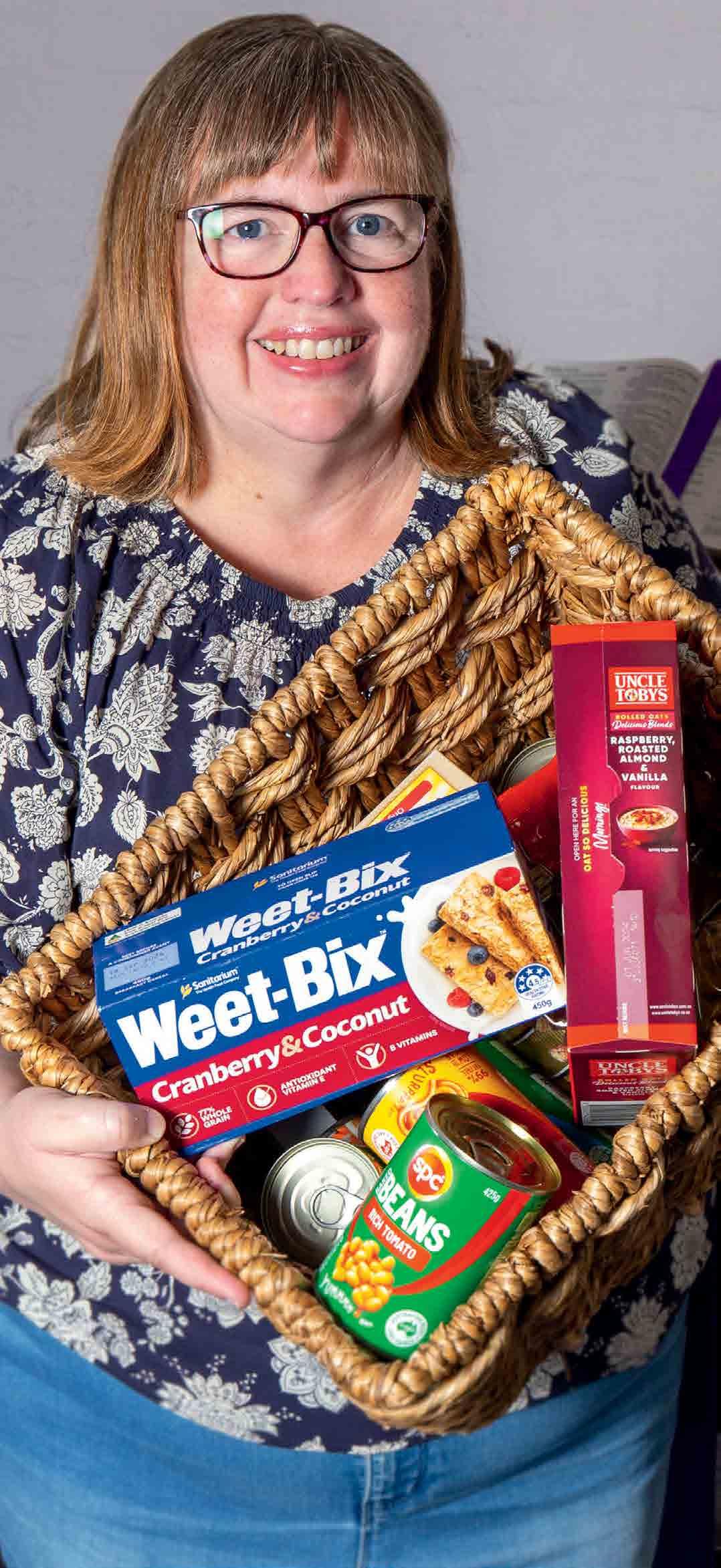
Crosslight is a bi-monthly magazine produced by the Communications unit of the Uniting Church in Australia Synod of Victoria and Tasmania. Opinions expressed in Crosslight do not necessarily reflect those of the editor or the policies of the Uniting Church.
While Crosslight endeavours to publish all articles in a timely manner, they may be held over occasionally for a variety of reasons. In that event, any article will be included in the following edition of the magazine.
Advertising
Crosslight accepts advertising in good faith. Acceptance of advertising does not imply endorsement. Advertising material is at the discretion of the publisher.
Advertising deadlines for June, 2024 Issue:
Bookings
April 18, 2023
Copy & images for production
April 25, 2024
Print ready supplied PDF May 08, 2024
See crosslight.org.au for full details.
Distribution
Crosslight is usually distributed the first Sunday of the month.
Circulation: 16,000
Editor
Andrew Humphries
Ph: 0439 110 251 andrew.humphries@victas.uca.org.au
Graphic design, Photography and print services
Carl Rainer (03) 9340 8826 carl.rainer@victas.uca.org.au
Advertising and Distribution
Dominic Kouts
Ph: 03 9340 8846 dominic.kouts@victas.uca.org.au
UCA Synod office
130 Lonsdale St Melbourne Victoria 3000
Feedback & correspondence
crosslight@victas.uca.org.au
ISSN 1037 826X
Next issue: June 2024

39
ucavictas ucavictas
40 Uniting is the community services organisation of the Uniting Church in Victoria and Tasmania. Food For Families. Thanks to you. Put food on the table - all year round. Everyday we dig deeper to provide support when people need it most. We want to support everyone who reaches out to us, no matter what time of year it is - but we can’t do it alone. Here’s how you can get involved in Food For Families:
donate non-perishable food and essential items
host a collection drive • be a community drop off point for donations • make a donation to directly support vulnerable people needing access to food. Call us 1800 668 426 Visit foodforfamilies.org.au Scan to learn more
•
•









 Rev Jay Robinson Minister and Chaplain
Rev Jay Robinson Minister and Chaplain



 From P7
From P7



 Rev Alex Sangster with Peter, one of the engagement hub’s long-time participants.
Image: Carl Rainer
Rev Alex Sangster with Peter, one of the engagement hub’s long-time participants.
Image: Carl Rainer








 Ron and Mardie Townsend hold a photo of Paul (middle), Ruth and Joel at Paul’s 30th birthday picnic.
Image: Carl Rainer
Ron and Mardie Townsend hold a photo of Paul (middle), Ruth and Joel at Paul’s 30th birthday picnic.
Image: Carl Rainer









 Mardie Townsend hopes her book about son Paul’s battle with schizophrenia will shine a light on the mental health system.
Image: Carl Rainer
Mardie Townsend hopes her book about son Paul’s battle with schizophrenia will shine a light on the mental health system.
Image: Carl Rainer

 Rev David Kim and Rev Sandy Brodine bring a wealth of experience to the equipping Leadership for Mission unit.
Image: Carl Rainer
Rev David Kim and Rev Sandy Brodine bring a wealth of experience to the equipping Leadership for Mission unit.
Image: Carl Rainer





















































